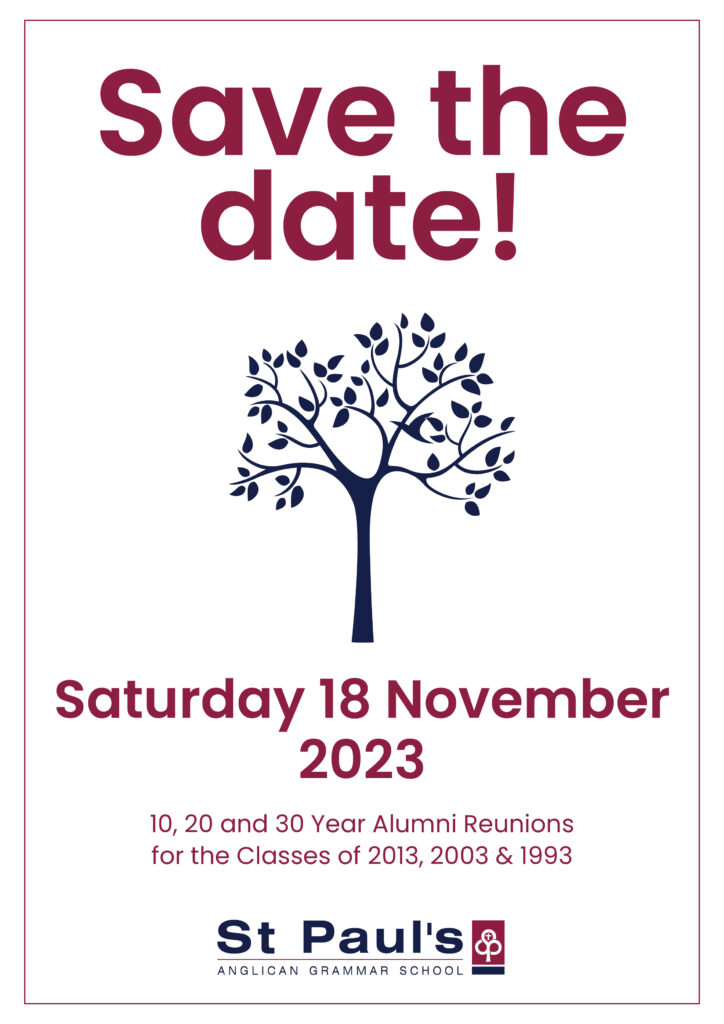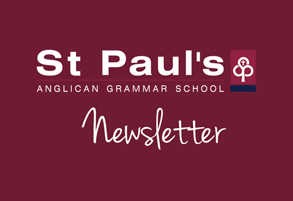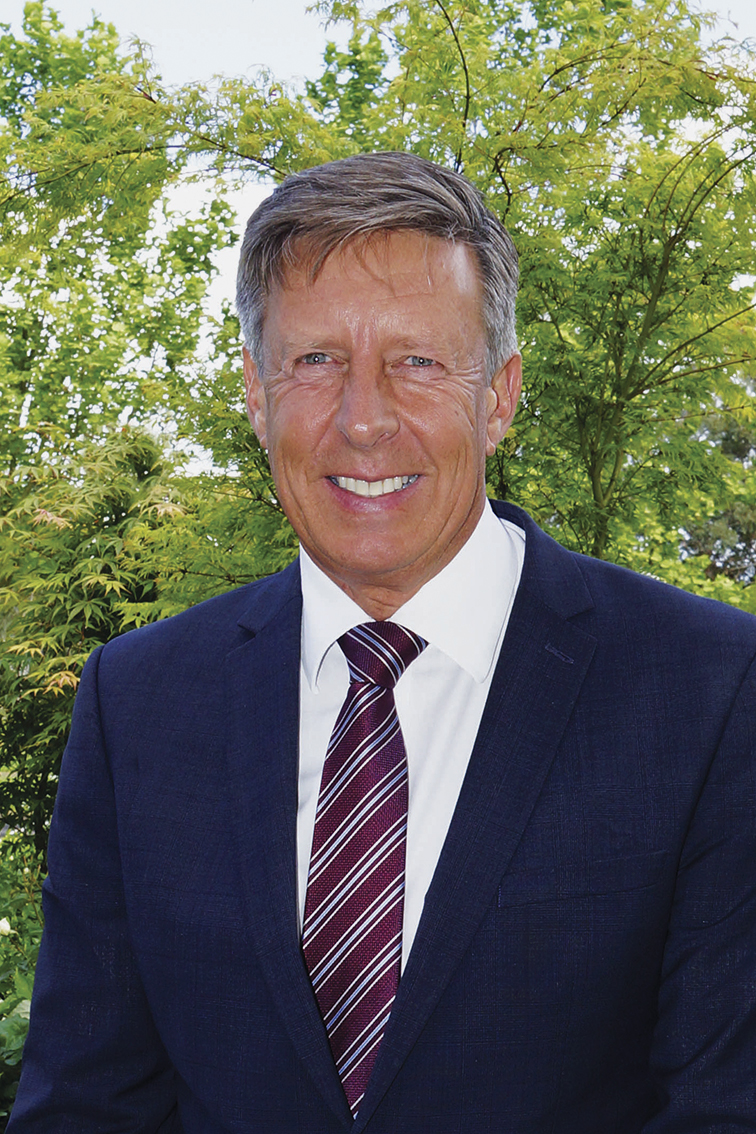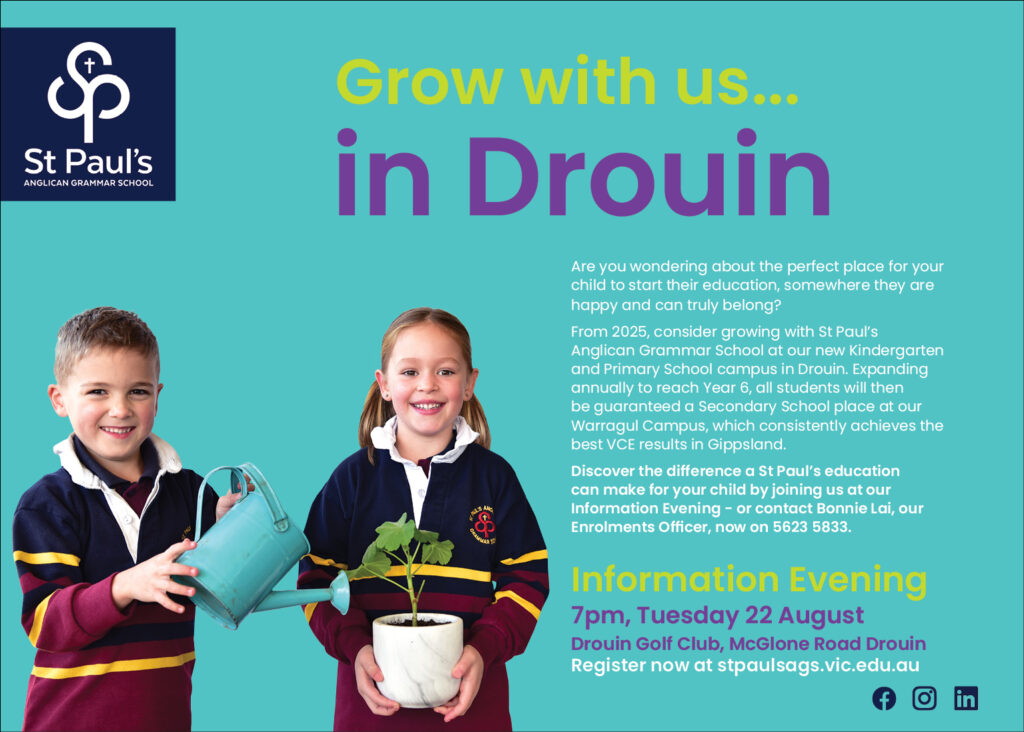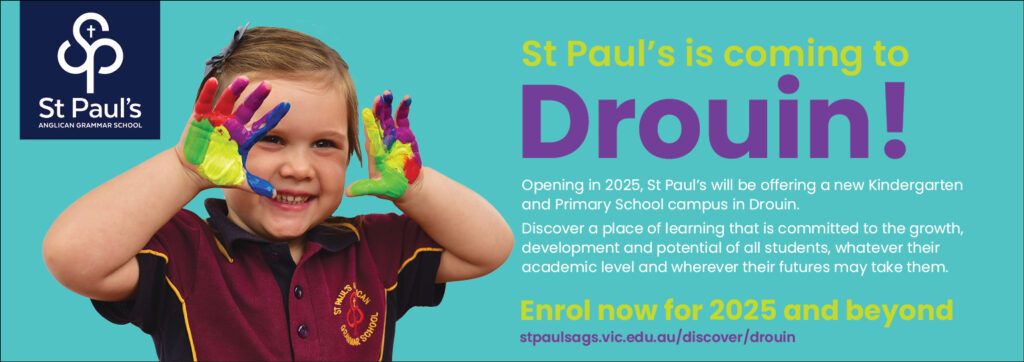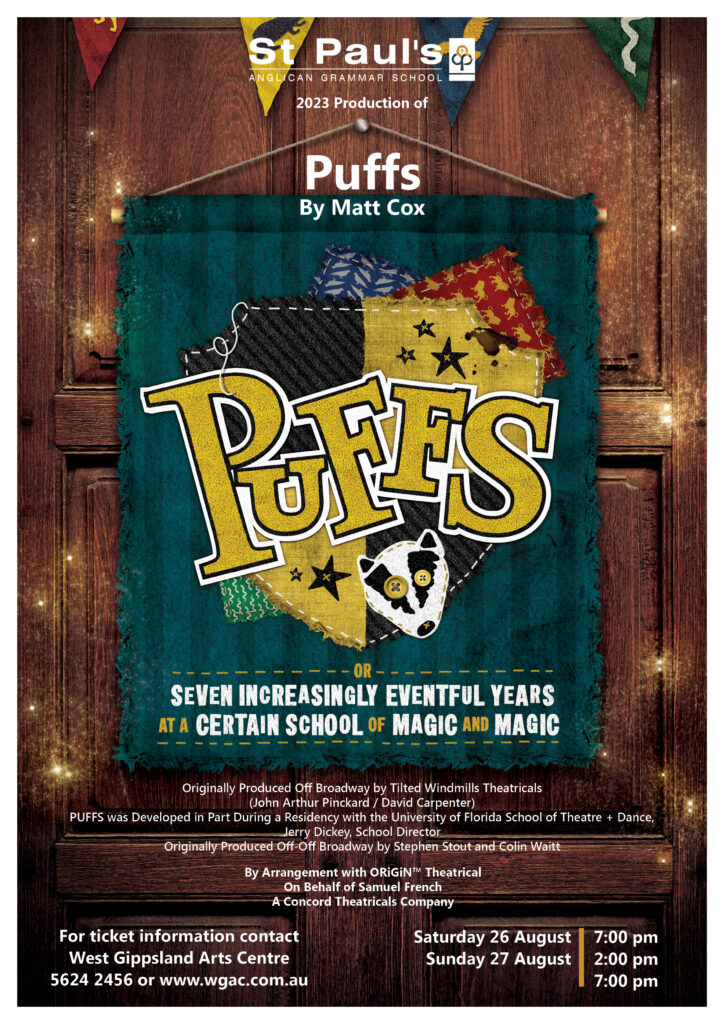In this issue
• Warragul Secondary School’s production – ‘PUFFS’
• Parent Support
• Alumni Profile: Brinley Eastwood – Class of 2006
• RoboCup
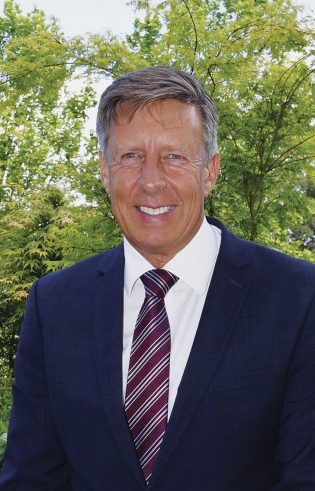
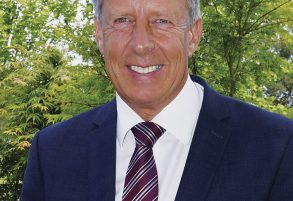
From the Principal
I wish to acknowledge and thank Ms Donna Sweeney for being Acting Principal during my Sabbatical Leave in the United States of America. I learned a great deal from my leadership course at Harvard University and made many valuable connections with School Principals and educators from all around the world. …
From the Principal
I wish to acknowledge and thank Ms Donna Sweeney for being Acting Principal during my Sabbatical Leave in the United States of America. I learned a great deal from my leadership course at Harvard University and made many valuable connections with School Principals and educators from all around the world. Approximately thirty countries were represented, along with approximately thirty American states. The resultant diversity of experience and range of contexts represented by the group made for robust conversations and deep learning, which I know will continue, albeit largely virtually, in the years ahead.
I also thank Business Manager Mrs Leah Young for representing St Paul’s at last week’s Ecumenical Schools Australia conference, and Chaplains Reverend Daniel Lowe and Mr Glen Treble for representing us at the Anglican Schools Australia national conference in Canberra. These groups are of great support to St Paul’s and other member schools. There are twenty schools in Ecumenical Schools Australia and over 150 Anglican schools in the country, and we all benefit from the mutual support and professional learning provided.
It is vital for teachers and educational leaders to be learners as well, and the ultimate beneficiaries, of course, are our students.
Cameron Herbert
Principal
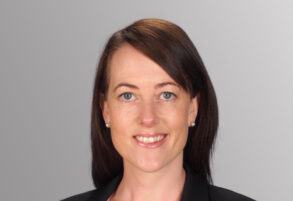
Warragul Secondary School
From the Head of Warragul Secondary School, Ms Laura Butterworth. Parent Student Teacher Interviews (PSTIs) The Term 3 Parent Student Teacher Interviews (PSTIs) are fast …
Warragul Secondary School
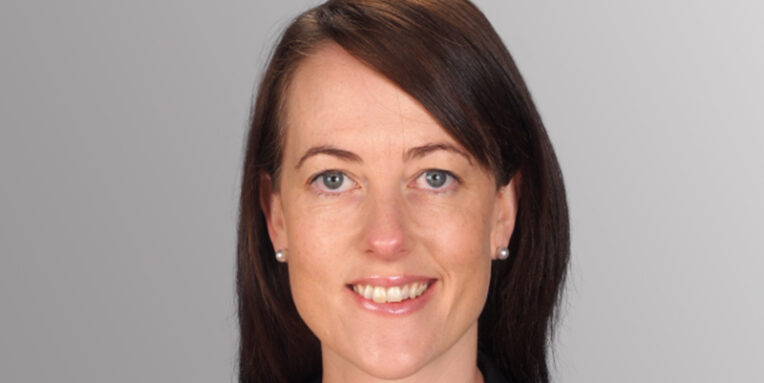
From the Head of Warragul Secondary School,
Ms Laura Butterworth.
Parent Student Teacher Interviews (PSTIs)
The Term 3 Parent Student Teacher Interviews (PSTIs) are fast approaching. Bookings are now open, and all families should have received an email with booking instructions on Wednesday 9 August. Please contact the school if you did not receive the email.
• PSTIs, Session 1 – Traditional, Face to face interviews at Warragul Secondary School, Tuesday 22 August, commencing at 3:45 pm to 7:45 pm
• PSTIs, Session 2 – Online Zoom interviews, Wednesday 30 August, commencing at 3:45 pm to 8:15 pm.
Our two scheduled evenings of PSTIs at Warragul Secondary School are fast approaching. The first evening, a ‘Face to face’ in-person interview evening, is scheduled for Tuesday 22 August, 3:45 pm to 7:45 pm. Students are warmly invited to attend the ‘Face to face’ interviews in their school uniforms. Communication has been sent to families and bookings are now open.
The second evening is planned as an online Zoom PSTI meeting to allow families a little more flexibility. This evening is planned for Wednesday 30 August, 3:45 pm to 8:15 pm. Bookings for this evening are now open.
To prepare for a Zoom meeting with individual staff, parents/guardians are encouraged to set aside a quiet, confidential space at home with their child with minimal distractions. We would love for our families to ensure that their cameras are turned on and that the name registered for the Zoom meeting is the attending parent/guardian’s name.
We look forward to meeting with you on either or both evenings to discuss your child/ren’s progress.
Maximising the Effectiveness of Parent Student Teacher Interviews: Advice for Parents
At St Paul’s, we believe that Parent Student Teacher Interviews represent an important opportunity to stop and reflect on your child’s journey as a learner. Ideally, these conversations can be a catalyst to guide future learning. Consequently, each interview should not just be a discussion about the past but about the ‘next step’. The ‘conversation starters’ listed below are designed to help your family maximise the opportunities that the interviews present.
Questions to ask your child’s teachers:
1. What has my child had success with so far in your subject?
2. If my child could do one thing to make the most improvement in your subject, what would that one thing be?
3. What can I do at home to help my child with this?
Language that you can use to help your child adopt a ‘growth mindset’:
At St Paul’s, we are embedding psychologist Carol Dweck’s notion of a growth mindset: that intelligence and abilities are not fixed and can be developed through persistence and effort (Dweck, 2006). You can help your child to cultivate a growth mindset through the language that you use to discuss their progress and effort with them. When learners adopt a growth mindset they are more likely to feel motivated to strive to achieve their best. They do not feel overwhelmed by setbacks that occur because they understand that challenges are simply opportunities to learn and improve. They also know that their results do not represent their worth or their potential. With this in mind, here are some ‘conversation starters’ that you might like to discuss with your child after their interviews.
• What was the biggest challenge that you faced last term? How did you tackle it?
• Which task did you put the most effort into preparing for? What happened?
• I am really proud of the determination that you showed when you…
• Are there any new strategies that you would like to try this term?
• Which subject are you feeling most excited about this term? Why?
• What challenges/tasks are you looking forward to this term?
Dweck, C. (2006). Mindset: The New Psychology of Success. New York. Random House.
SCHOOL TV – Neurodiversity
 Neurodiversity emphasises the natural variation in how an individual’s brain functions and how they perceive and interact with the world, leading to diverse ways of learning and communicating. While most young people are neurotypical, some exhibit variations in brain development, such as ADHD, autism or dyslexia, making them neurodivergent.
Neurodiversity emphasises the natural variation in how an individual’s brain functions and how they perceive and interact with the world, leading to diverse ways of learning and communicating. While most young people are neurotypical, some exhibit variations in brain development, such as ADHD, autism or dyslexia, making them neurodivergent.
Embracing neurodiversity involves accepting, celebrating and supporting neurodivergent children and adolescents without attempting to change or treat their differences. Using respectful language, challenging unhelpful attitudes, avoiding assumptions and actively promoting inclusivity can help embrace neurodiversity effectively.
Acknowledging the unique ways neurodiverse young people do things and then adapting tasks and activities to ensure their full participation will encourage them to develop strategies that feel natural to them. It will help improve their mental health, wellbeing and sense of self. By recognising and nurturing their strengths, parents and caregivers can contribute to building an inclusive and compassionate society where all young people can thrive.
Learning more about neurodiversity equips caregivers with insights into effective communication techniques, educational strategies and parenting approaches tailored to the specific needs of their neurodivergent child. We hope you take the time to reflect on the information offered in this month’s edition of SchoolTV and we always welcome your feedback.
If you have any concerns about the wellbeing of your child, please contact the school for further information or seek help from a medical professional.
Here is the link to this month’s edition of https://stpaulsags.vic.schooltv.me/newsletter/neurodiversity.
Laura Butterworth
Head of Warragul Secondary School
WHAT’S ON
AUGUST
11 August to 14 August Sport Aerobics National Championships, Adelaide Entertainment Centre
14 August ICAS English – only Years 7 to 10 students who have chosen to take part in the testing
Lawn Bowls Trials, Warragul Bowling Club, 3:20 pm to 4:50 pm
15 August SEISA Dance and Theatre Sports
Live4Life Crew Training Day, West Gippsland Arts Centre, 9:45 am to 2:15 pm
17 August SEISA Winter Sport, Intermediate/Senior, Round 5
Studio Concert, Ben Sim and Chris Sim, Science Centre Lecture Theatre, 5:00 pm to 6:30 pm
Studio Concert, Tamara Warden, Lynn Jones and Jonathan Baker, Science Centre Lecture Theatre, 7:00 pm to 8:30 pm
18 August Sport Aerobics Training, Warragul Secondary School Gymnasium and Dance Studio, 6:55 am to 8:15 am
Arthur Bolkas Talk – The Prison System Incursion, VCE Legal Studies, 9:05 am to 10:45 am
21 August ICAS Science – only Years 7 to 10 students who have chosen to take part in the testing
22 August Parent Student Teacher Interviews (PSTIs) Session 1, Face to face session, Warragul Secondary School Gymnasium, 3:45 pm to 7:45 pm
23 August ‘PUFFS’ Warragul Secondary School Production – Technical Rehearsal, School Dance Studio, all cast and backstage crew, 9:00 am to 3:10 pm
23 August to 27 August Interschool Snowsports Team, Mount Buller
24 August SEISA Winter Sport, Intermediate/Senior, Finals
‘PUFFS’ Warragul Secondary School Production – Dress Rehearsal, School Dance Studio, all cast and backstage crew, 9:00 am to 3:10 pm
25 August Sport Aerobics Training, Warragul Secondary School Gymnasium and Dance Studio, 6:55 am to 8:15 am
Gymnastics Training, Warragul Gymnastics Centre, 7:00 am to 8:00 am
‘PUFFS’ Warragul Secondary School Production – Bump In and Technical Set Up, School to West Gippsland Arts Centre, Year 11 Theatre Studies students and selected backstage crew, 9:00 am to 3:10 pm
26 August ‘PUFFS’ Warragul Secondary School Production – Dress Rehearsal in Theatre, West Gippsland Arts Centre, all cast and backstage crew, 10:00 am to 5:00 pm
‘PUFFS’ Warragul Secondary School Production – Show, West Gippsland Arts Centre, all cast and backstage crew, 7:00 pm to 10:00 pm
27 August ‘PUFFS’ Warragul Secondary School Production – Matinee, West Gippsland Arts Centre, all cast and backstage crew, 2:00 pm to 5:00 pm
‘PUFFS’ Warragul Secondary School Production – Show, West Gippsland Arts Centre, all cast and backstage crew, 7:00 pm to 10:00 pm
28 August School Gymnastics Carnival, State Gymnastics Centre, Windsor
ICAS Mathematics – only Years 7 to 10 students who have chosen to take part in the testing
29 August School Gymnastics Carnival, State Gymnastics Centre, Windsor
Ellinbank Research SmartFarm Excursion, Year 11 Environmental Science students, 11:00 am to 3:00 pm
30 August Parent Student Teacher Interviews (PSTIs) Session 2, online Zoom session, Warragul Secondary School Gymnasium, 3:45 pm to 8:15 pm
31 August SEISA Cross Country
Year 8 Swim Assessment, Warragul Leisure Centre, selected students only, 11:15 am to 12:45 pm
SEPTEMBER
1 September ESP/ADP Seminar, Year 9 Centre, students in High Performance Programs, 10:00 am to 2:20 pm
4 September to 6 September Year 12 VET Sport and Recreation Camp, Mornington Peninsula
7 September Year 12 English SAC, Year 12 Common Room, 1:40 pm to 3:10 pm
11 September Year 9 Eye in the Sky – Emerging Technologies Excursion, RMIT, 7:06 am to 4:48 pm
12 September Scienceworks Museum – Year 8 Excursion, 9:00 am to 4:00 pm
13 September Studio Concert, Chris Staben, Alisha Redmond and Steven Forster, DT Parker Centre, 7:00 pm to 8:30 pm
14 September R U OK? Day
SEISA Spring Carnival
15 September Footy Colours Day
Year 12 English Practice Exam, 9:00 am to 12:30 pm
End of Term 3, 2:10 pm finish
DOBSONS TRADING HOURS

Order online or click and collect: Please ensure that you only attend the store to collect your items once you have received notification that your order is ready, order here.
TEEN MENTAL HEALTH FIRST AID
As part of the Baw Baw Live4Life program, all Year 8 and Year 10 students complete the Teen Mental Health First Aid course (TMHFA).
St Paul’s attended the Live4Life launch earlier this year with other local schools, with several Years 9 and 10 students involved in the Live4Life crew. Year 10 student Brodie Pyle and Year 12 student Sharni Boote also acted as MCs on the day to a combined audience of about 1,200 students across two sessions.
The Year 8 TMHFA course began this week and takes up three separate sixty-minute sessions. The Year 10 MHFA course is due to take place in Term 4 and further information will be sent to parents closer to the date.
Should you wish to learn more about the course, any parent is welcome to peruse the handbook used for the course (available at reception) or visit the Mental Health First Aid website: teen | Mental Health First Aid (mhfa.com.au)
A number of Warragul Secondary School staff have completed the Youth Mental Health First Aid course, as well as seeking further education in this area, via webinars, short courses and even a Monash University professional certificate.
Gordon Oldham
Deputy Head of Secondary School
PARENTING SUPPORT
We have all heard the saying, “Parenting doesn’t come with a manual”. Whilst this is certainly true, there are programs out there that are designed to upskill and provide guidance to parents.
Parentline
Parentline is a free telephone counselling service for Victorian parents and carers of children and adolescents aged 0 to 18 years. Run by social workers, psychologists and family therapists, Parentline runs from 8:00 am until midnight, every day of the year. You can speak to the same counsellor each time you call and there is no time limit or maximum number of calls you can make. If you are ever in need of parenting advice or support, call Parentline on 13 22 89.
Reach Out Coaching
Reach Out has a free coaching service for parents, designed to help you support your teenagers through tough times. This is a confidential service for parents of adolescents aged 12 to 18 years. Delivered in a one-to-one format, you can access four free coaching sessions at https://parents.au.reachout.com/one-on-one-support.
Triple P
Triple P is an evidence-based parenting program that helps to increase your confidence in raising your children. It is designed to improve parent-child relationships as well as give you the tools to encourage positive behaviour, teach new skills/behaviours and manage misbehaviour. The strategies provided are easily adapted to suit your own values, beliefs and your family’s needs. Triple P is a program that is delivered worldwide and many studies have demonstrated how effective it can be.
Triple P also has a program for parents of children with anxiety. This program helps you to understand your child’s anxiety and the ways you can help your child manage this. It also teaches you how to teach your child strategies for managing anxiety, both now and in the future.
Both of these programs are currently free and are able to be completed online at a time that suits you. Delivered in thirty to sixty minute modules, you can complete this on your phone, tablet or laptop/computer. You can access the Triple P program at https://www.triplep-parenting.net.au/au/free-parenting-courses/triple-p-online-under-12/.
Family Man
Family Man is a free, online parenting program designed for dads, although mums and other carers are welcome to use it as well. Evidence-based and designed by leading experts, you can even sign up to receive a daily text message for two weeks containing tips and techniques. You can access this program at https://familyman.movember.com/en-au/.
MyStPauls
The MyStPauls Student Wellbeing Information For Parents page has a collection of resources and programs that have been selected by the St Paul’s Anglican Grammar School counselling team to support you in supporting your children. Updated frequently, this can be a useful tool if you are looking for information. Visit the page at https://my.stpaulsags.vic.edu.au/homepage/13368.
Shannon Staples
Head of Counselling Services
YEAR 9 CITY CAMP
After three City Days exploring Melbourne, and building confidence and independence in navigating transport and the dynamic city environment, the Year 9 students were ready and eager for their City Camp. On Wednesday 21 June, Year 9 students and staff embarked on a three-day trip to Melbourne, confronted with the first hurdle of the camp – a switch from V/Line train travel to replacement buses, which moved at a snail’s pace during peak hour traffic.
City Camp provides a mix of cultural and recreational activities that included watching a film, participating in rock climbing and ice skating, and visiting historically significant places such as Melbourne Museum, Old Melbourne Gaol and the Melbourne Cricket Ground (MCG).
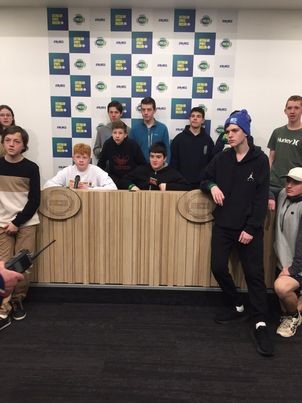
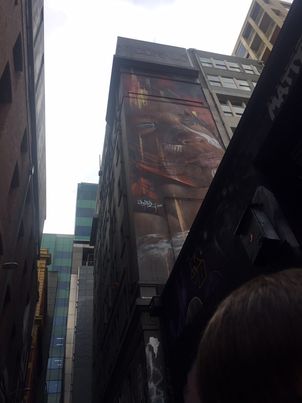 City Camp also offers the opportunity and encouragement to diversify friendships by making new connections as we prepare students for senior years. Moreover, camp helps students feel better prepared for future visits to Melbourne, whether it be for sporting or art events, catching up with friends and family, or perhaps even beginning their university journey away from the familiarity of regional life.
City Camp also offers the opportunity and encouragement to diversify friendships by making new connections as we prepare students for senior years. Moreover, camp helps students feel better prepared for future visits to Melbourne, whether it be for sporting or art events, catching up with friends and family, or perhaps even beginning their university journey away from the familiarity of regional life.
We are so proud of our students who demonstrated great compassion, enthusiasm and friendship on camp as they faced challenges, were fatigued from a busy itinerary and worked together as a team. No doubt they will reflect on the memories of this camp throughout the years to come.
Kelly Bailey
Head of Year 9
Warragul Secondary School
WARRAGUL SECONDARY SCHOOL ENSEMBLE REHEARSALS
Warragul Secondary School Updated Ensemble Rehearsal Schedule
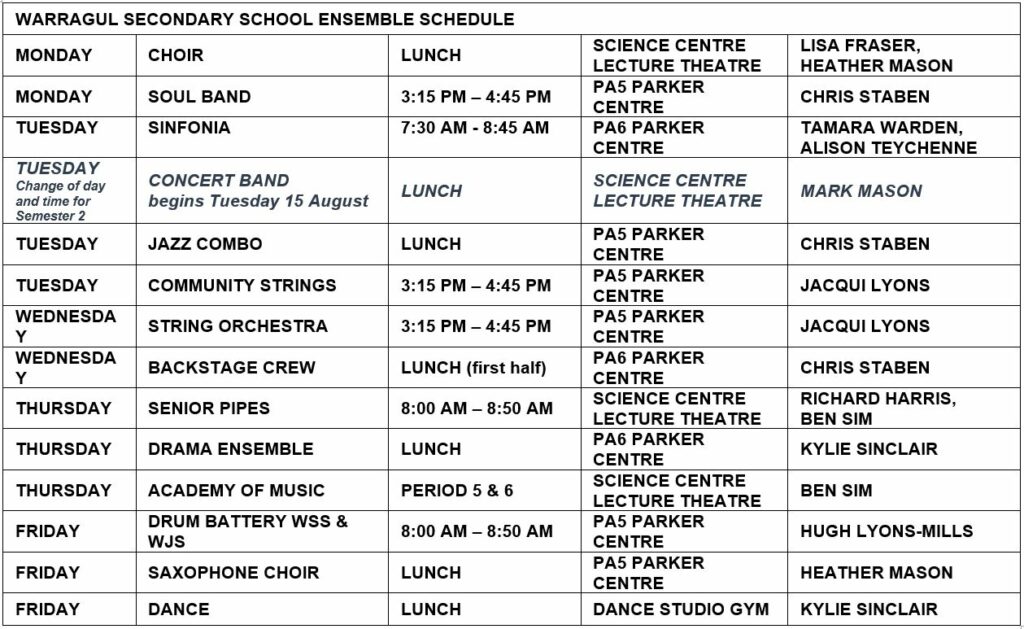 *Soul Band and Jazz Combo are audition/invitation ensembles only. Please contact Mr Chris Staben for further information regarding these ensembles: crstaben@stpaulsags.vic.edu.au
*Soul Band and Jazz Combo are audition/invitation ensembles only. Please contact Mr Chris Staben for further information regarding these ensembles: crstaben@stpaulsags.vic.edu.au
New members and students having lessons outside of school are most welcome. Please contact Mrs Heather Mason and/or the listed ensemble director for further information: hjmason@stpaulsags.vic.edu.au
Heather Mason
Head of Performing Arts – Co-curricular
ST PAUL’S PARENT PRAYER GROUP
“Where two or three people gather in my name, I am there with them.” Matthew 18:20
The St Paul’s parent prayer group meets on the first Monday of each month during school terms. We try to keep the meeting brief (we are usually done by 9:45 am) and casual (younger children are most welcome). The group encompasses people both very comfortable with praying, as well as those newer to praying with others. Feel free to get in touch with any questions beforehand or just attend when you are able during the year.
Our next gathering is Monday 4 September, 9:00 am in the Prideaux Centre, Warragul Junior School
Contact: Sheryn Cutler 0417 158 937 or sheryn.cutler@gmail.com
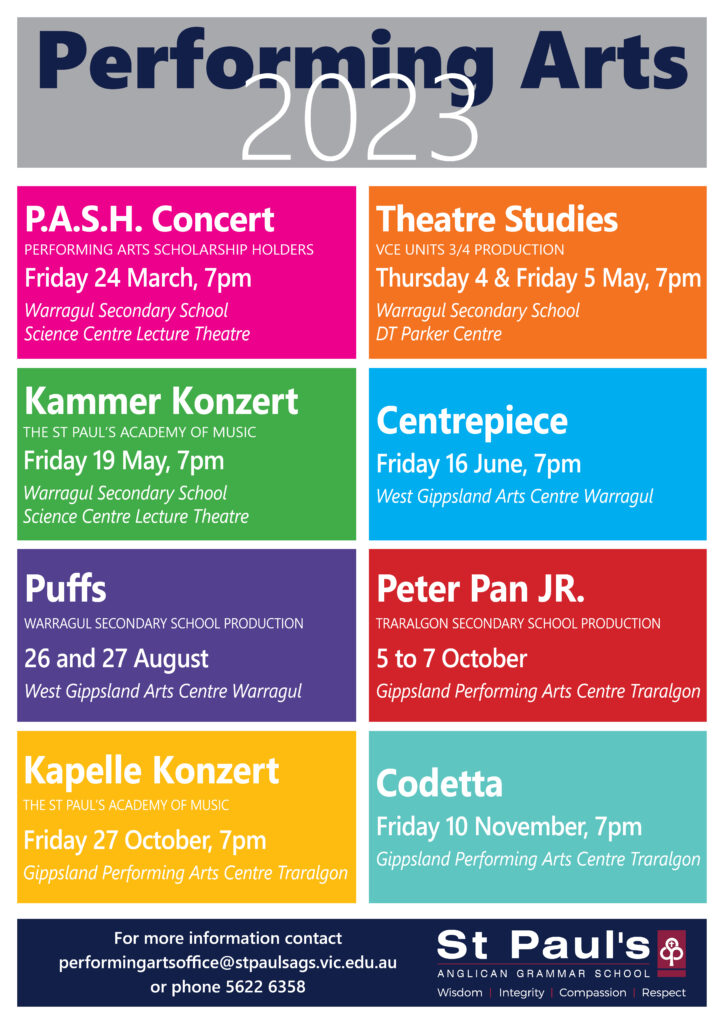
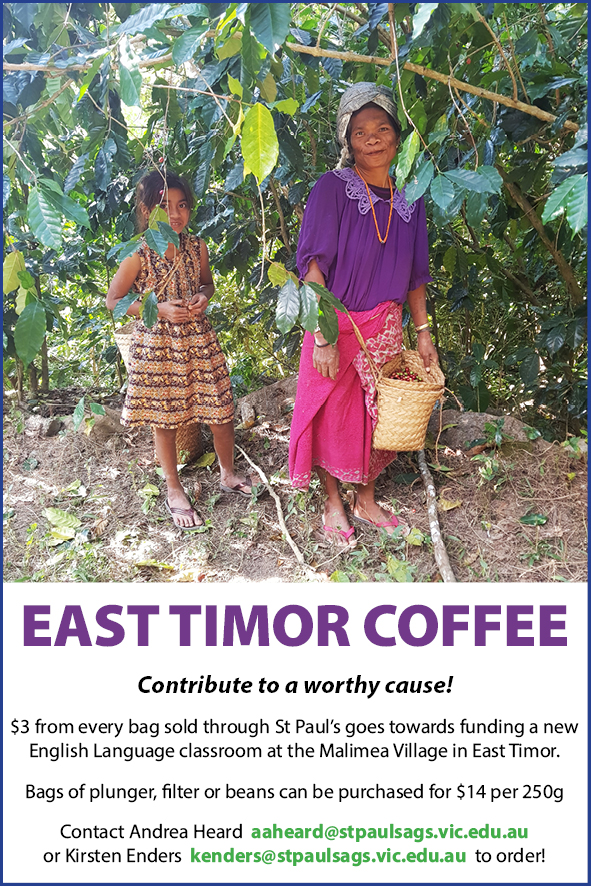
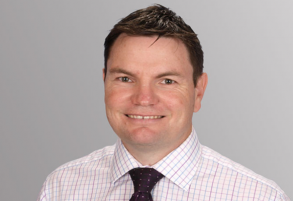
Warragul Junior School
From the Head of Warragul Junior School, Mr Rowan van Raay. ICAS Competitions, Australian Mathematics Competition, Prep 100 Days of School, Family Snow Sports Camp, …
Warragul Junior School
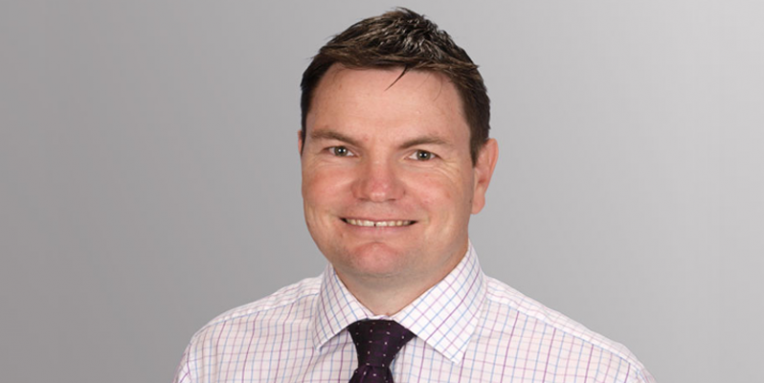
From the Head of Warragul Junior School,
Mr Rowan van Raay.
ICAS Competitions, Australian Mathematics Competition, Prep 100 Days of School, Family Snow Sports Camp, Year 1 Excursion, Parent Prayer Group, Regional Lion’s Club Public Speaking preparation and RoboCup training are among the many special activities and events that have taken place over the past fortnight.
Prep 100 Days of School
Our Prep classrooms turned into learning areas for the elderly as our Preps celebrated their first 100 Days of School. The students and staff went to a great deal of effort to dress up with some very creative outfits as they celebrated everything 100. The Preps were very excited to reach this milestone but did take a little convincing that school is not finished just yet (only about 2,250 days to go which is quite a lot of lunches to prepare and uniforms to wash!).
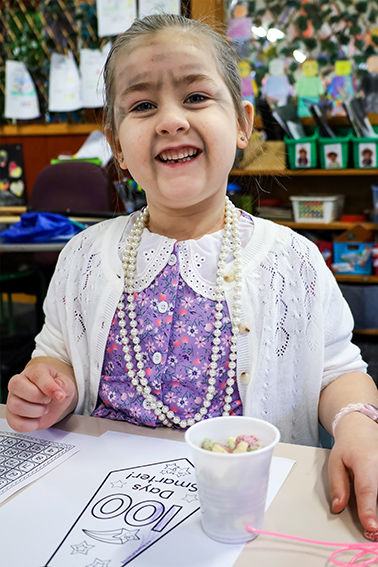
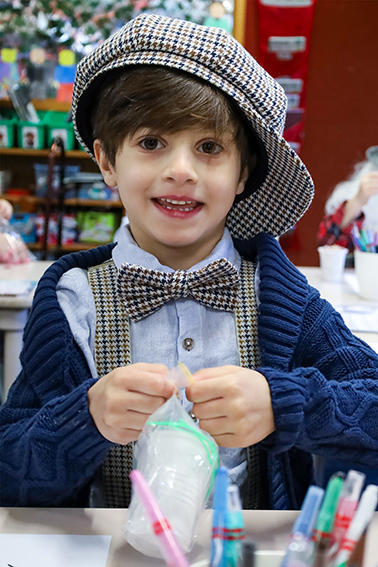
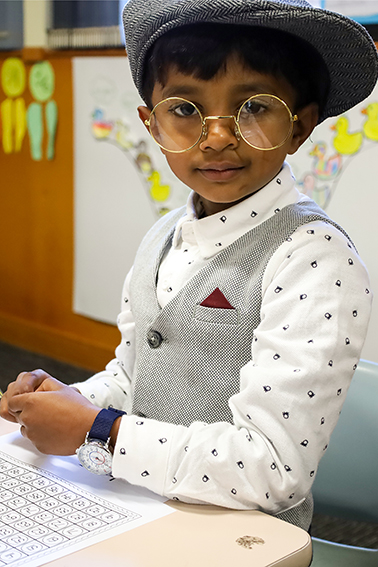
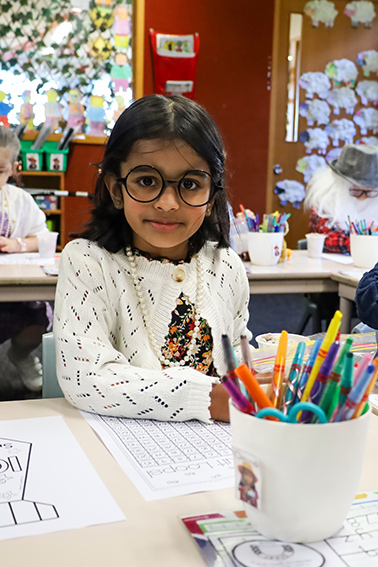
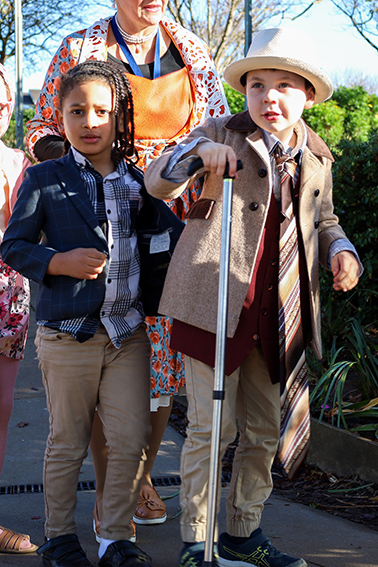 Family Snow Sports Camp
Family Snow Sports Camp
Our thanks to Mrs Leighton for organising and running the Family Snow Sports Camp last week. Several families attended and while the weather conditions were mixed, everyone thoroughly enjoyed their time on the mountain.
Independent School Victoria (ISV) Surveys
We find it helpful to regularly seek feedback from our students, staff and families. Recently all of our Years 5 and 6 students completed the ISV survey in class. All staff and families have also been invited to complete a survey from ISV and I ask that all families take a moment to complete the survey to enable us to gain some valuable feedback. These survey results are used to highlight, acknowledge and celebrate the things we are doing well while seeking to identify what areas we can improve on.
School Camps
Our Pastoral team is reviewing our camp program which currently begins with our Year 2 Sleepover and works up to our four-night, five-day camp in Year 6. I would be grateful, if parents had any feedback they would like to share with the team about our camp program, that you email Mr Barkla via pjbarkla@stpaulsags.vic.edu.au.
Semester 2 Parent Teacher Interviews (PTIs)
Information regarding our Warragul Junior School Parent Teacher Interviews (PTIs) will be emailed to families next week. These will be held on Wednesday 30 August, 3:30 pm to 6:00 pm or Thursday 31 August, 3:30 pm to 6:00 pm and 7:00 pm to 8:00 pm. Please note that Miss Oliver will conduct 2W3 PTIs the following week on Tuesday 5, Wednesday 6 and Thursday 7 September, 3:30 pm to 6:00 pm. All interviews will be conducted face-to-face.
Rowan van Raay
Head of Warragul Junior School
WHAT’S ON
AUGUST
14 August Year 5 Excursion to Gumbuya World
16 August Years 2 to 6 ICAS English Competition (registered children only)
18 August Bullying No Way: Nation Day of Action
Pre-Prep to Year 6 Incursion, Indigenous Cultural Performance – Sean Choolburra
21 August Years 2 to 6 ICAS Science Competition (registered children only)
21 to 25 August Book Week
23 August Years 2 to 6 ICAS Spelling Bee Competition (registered children only)
25 August Year 7 2024 Friendship Morning, Warragul Secondary School
28 August Years 2 to 6 ICAS Maths Competition (registered children only)
29 August Years 5 and 6 Hoop Time (selected students only)
30 August Parent Teacher Interviews
31 August Parent Teacher Interviews
SEPTEMBER
1 September Father’s Day Stall
4 September Parent Prayer Group
5 September Years 3 and 4 Hoop Time (selected students only)
11 September Grandparents Day
12 September Canberra Tour Information Session
14 September R U OK? Day
14 September Year 3 Excursion
15 September Footy Colours Day – Pie Lunch Day
15 September End of Term 3, 2:20 pm finish
DOBSONS TRADING HOURS

Order online or click and collect: Please ensure that you only attend the store to collect your items once you have received notification that your order is ready, order here.
PARENTING SUPPORT
We have all heard the saying, “Parenting doesn’t come with a manual”. Whilst this is certainly true, there are programs out there that are designed to upskill and provide guidance to parents.
Parentline
Parentline is a free telephone counselling service for Victorian parents and carers of children and adolescents aged 0 to 18 years. Run by social workers, psychologists and family therapists, Parentline runs from 8:00 am until midnight, every day of the year. You can speak to the same counsellor each time you call and there is no time limit or maximum number of calls you can make. If you are ever in need of parenting advice or support, call Parentline on 13 22 89.
Reach Out Coaching
Reach Out has a free coaching service for parents, designed to help you support your teenagers through tough times. This is a confidential service for parents of adolescents aged 12 to 18 years. Delivered in a one-to-one format, you can access four free coaching sessions at https://parents.au.reachout.com/one-on-one-support.
Triple P
Triple P is an evidence-based parenting program that helps to increase your confidence in raising your children. It is designed to improve parent-child relationships as well as give you the tools to encourage positive behaviour, teach new skills/behaviours and manage misbehaviour. The strategies provided are easily adapted to suit your own values, beliefs and your family’s needs. Triple P is a program that is delivered worldwide and many studies have demonstrated how effective it can be.
Triple P also has a program for parents of children with anxiety. This program helps you to understand your child’s anxiety and the ways you can help your child manage this. It also teaches you how to teach your child strategies for managing anxiety, both now and in the future.
Both of these programs are currently free and are able to be completed online at a time that suits you. Delivered in thirty to sixty minute modules, you can complete this on your phone, tablet or laptop/computer. You can access the Triple P program at https://www.triplep-parenting.net.au/au/free-parenting-courses/triple-p-online-under-12/.
Family Man
Family Man is a free, online parenting program designed for dads, although mums and other carers are welcome to use it as well. Evidence-based and designed by leading experts, you can even sign up to receive a daily text message for two weeks containing tips and techniques. You can access this program at https://familyman.movember.com/en-au/.
MyStPauls
The MyStPauls Student Wellbeing Information For Parents page has a collection of resources and programs that have been selected by the St Paul’s Anglican Grammar School counselling team to support you in supporting your children. Updated frequently, this can be a useful tool if you are looking for information. Visit the page at https://my.stpaulsags.vic.edu.au/homepage/13368.
Shannon Staples
Head of Counselling Services
ST PAUL’S PARENT PRAYER GROUP
“Where two or three people gather in my name, I am there with them.” Matthew 18:20
The St Paul’s parent prayer group meets on the first Monday of each month during school terms. We try to keep the meeting brief (we are usually done by 9:45 am) and casual (younger children are most welcome). The group encompasses people both very comfortable with praying, as well as those newer to praying with others. Feel free to get in touch with any questions beforehand or just attend when you are able during the year.
Our next gathering is Monday 4 September, 9:00 am in the Prideaux Centre, Warragul Junior School
Contact: Sheryn Cutler 0417 158 937 or sheryn.cutler@gmail.com
WARRAGUL JUNIOR SCHOOL ENSEMBLE REHEARSAL SCHEDULE

New members and students having lessons outside of school are most welcome. Please contact Mrs Heather Mason and/or the listed ensemble director for further information: hjmason@stpaulsags.vic.edu.au
Heather Mason
Head of Performing Arts – Co-curricular
NEWS FROM OSHC
After a busy weekend, there was great excitement as the students arrived at our newly renovated OSHC space.
Thanks to Olivia Phelan’s (Prep) Nanny for a wonderful job painting our room before we installed our new shelves, which have created more space in our Chillax Lounge and students can clearly see all the resources available to them.
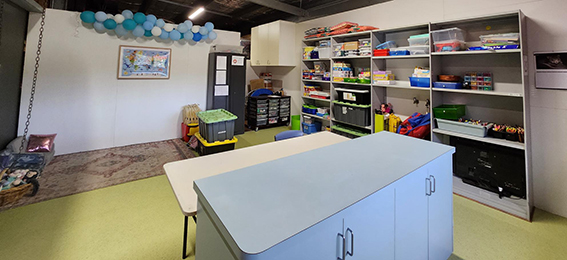
 Our numbers are growing with students enjoying the opportunity to socialise and have fun playing games and being creative together. They are enjoying our new winter menu with fried rice, pasta, warm croissants, homemade choc chip muffins, hot chocolate and Teddy Bear biscuits and other homemade goodies.
Our numbers are growing with students enjoying the opportunity to socialise and have fun playing games and being creative together. They are enjoying our new winter menu with fried rice, pasta, warm croissants, homemade choc chip muffins, hot chocolate and Teddy Bear biscuits and other homemade goodies.
 Our Mentors from Secondary School, Holly and Jimmy, bring a breath of fresh air to the group and a whole new level of fun as they introduce us to new games, shoot hoops and have great conversations during afternoon tea. Jim coaches Tennis on Tuesdays and Holly’s tips on the monkey bars are always popular!
Our Mentors from Secondary School, Holly and Jimmy, bring a breath of fresh air to the group and a whole new level of fun as they introduce us to new games, shoot hoops and have great conversations during afternoon tea. Jim coaches Tennis on Tuesdays and Holly’s tips on the monkey bars are always popular!
It is always a good sign when children tell their parents they are not ready to go home when they arrive to collect them.
Cath Stoney
Founder and Director
Club House Boot Camp
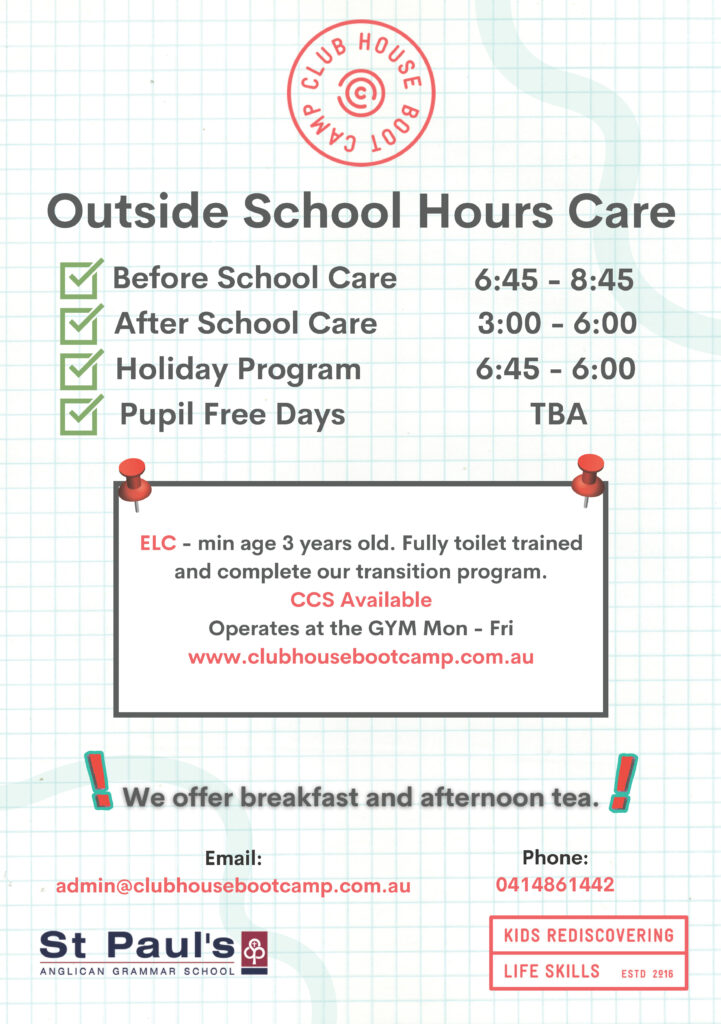


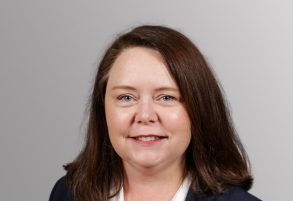
Traralgon Secondary School
From the Head of Traralgon Secondary School, Mrs Leonie Clark ‘The Friendship Five’ (Five core values for healthy relationships) “International Day of Friendship, 30 July …
Traralgon Secondary School
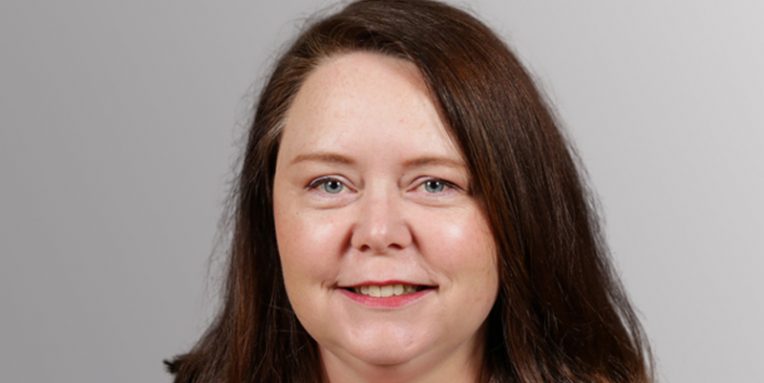
From the Head of Traralgon Secondary School,
Mrs Leonie Clark
‘The Friendship Five’ (Five core values for healthy relationships)
“International Day of Friendship, 30 July each year, is an initiative that follows the proposal made by UNESCO defining the Culture of Peace as a set of values, attitudes and behaviours that reject violence and endeavour to prevent conflicts by addressing their root causes with a view to solving problems.” (www.un.org)
The ‘International Day of Friendship’ provides an opportune moment to pause and reflect upon the meaning of friendship to our students at St Paul’s. What does it mean to be a quality friend? How can we continue to promote healthy friendships for our adolescents? How we can assist our children to manage and express feelings in a mutually compassionate and respectful manner that promotes integrity, forgiveness and peace when friendships are not progressing in healthy directions?
 For adolescents, friendships are ‘everything’. At a time when they are developing their independence and personal values, occasionally questioning the values of the family unit, an adolescent places far greater significance on the relationships they form with their peers than those of their family. Evolving adolescent friendships allow our children/adolescents valuable moments to develop an independent ability to navigate complex social networks as they work out their place in the world and how they might express their feelings and react with respect for themselves and others as they mature into adult relationships.
For adolescents, friendships are ‘everything’. At a time when they are developing their independence and personal values, occasionally questioning the values of the family unit, an adolescent places far greater significance on the relationships they form with their peers than those of their family. Evolving adolescent friendships allow our children/adolescents valuable moments to develop an independent ability to navigate complex social networks as they work out their place in the world and how they might express their feelings and react with respect for themselves and others as they mature into adult relationships.

Conversations with our children continue to be invaluable in reaffirming the importance of listening to others with care and compassion; empathising and understanding that not everyone has ‘exactly’ the same values; and promoting tolerance, forgiveness and respect as the key values that underpin all relationships, at school, at home and in the wider community.
As children mature, the school social landscape provides adolescents with a safe space to express their feelings and clear the air with a friend or other interpersonal relationship/s by explaining and communicating that “…it hurt me when you said… ” or “…I don’t like it when you… because it makes me feel…”. Allowing and encouraging our children to clearly express themselves, to understand their feelings and to articulate their concerns or friendship difficulties is just as important as teaching them how to be a true and good friend.
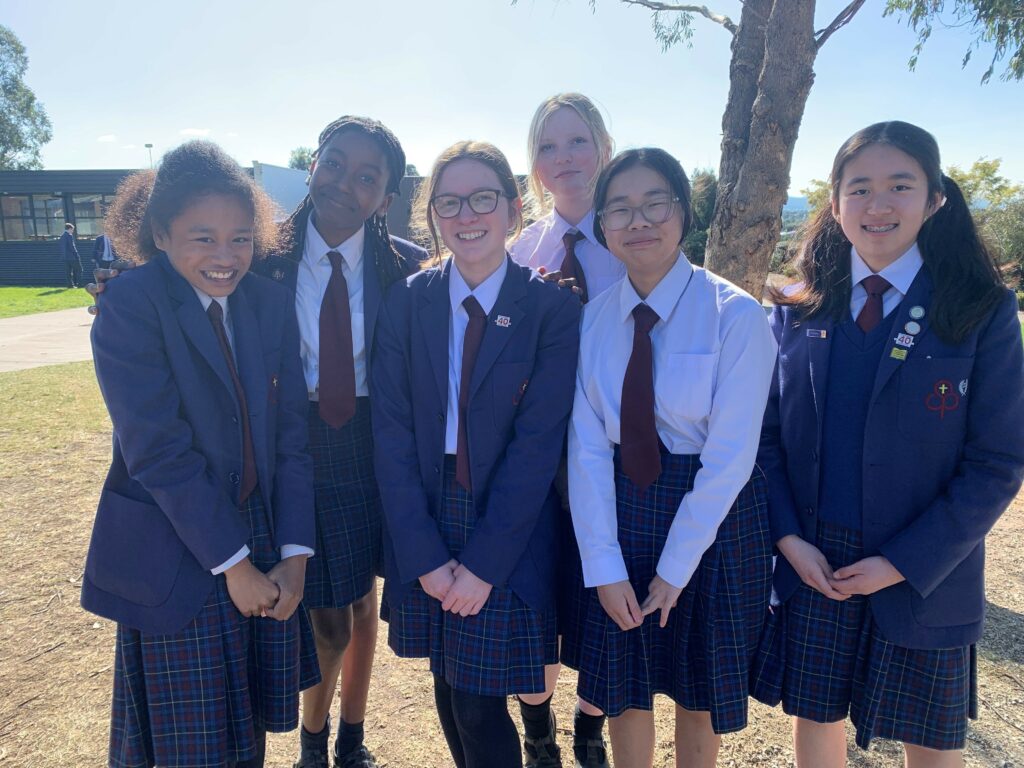
At St Paul’s, our Heads of Year gently coach and support our young people to understand that a quality friend is someone who walks beside you through all of life’s ups and downs, is trustworthy, respects you and will not turn others against you or talk behind your back. Our Mentors also work to reaffirm with our students that a good friend is someone who makes you a better person and who has your best interests at heart. We also support our students to begin to understand that a good friend is someone who can, when necessary, be brutally honest with you and with whom you can have an open and respectful conversation and ultimately forgive any inevitable mistakes.
Adolescent friendships change and evolve throughout Secondary School as adolescents reaffirm their values and begin to understand the importance and significance of seeking like-minded friendships/supports. Subsequently, they may gravitate towards other and new connections. Allowing children the space to ponder reflective questions such as, “What did I learn from this friendship?” or “What qualities should I look for in a good friend?” and “How can I rebuild trust within the relationship?”, are just a few examples of profound learning moments that assist students to draw their own conclusions and to foster personal and social independence. As guiding adults, we can take these moments to coach our children to work through this process with care, respect, forgiveness and compassion for the feelings of others while building individual student resilience and capacity for respectful communication and personal advocacy.
Andrew Fuller, together with Neil Hawkes and John Hendr, wrote an article titled ‘The Relationship Quotient – Creating Successful Relationships’. The article identifies five basic values that underpin all healthy relationships. The five values of trust, forgiveness, integrity, hope and compassion are interwoven and integral to understanding and forming successful friendships. In the article Fuller et al further share that trust is the “…belief that a person will not put their interest ahead of yours”, that forgiveness allows room for each party to “…‘give-for’ the relationship to grow… with an unconditional faith in the other person.” While integrity further builds the basis of trust as the individuals actually “…do the right thing and act in ways that are fair”. The “…belief that the future can be better” as all/both parties “…promise to care for each other with active giving” makes room for hope and a combined understanding that “…mistakes and times of trouble can be overcome”. The article acknowledges that we are not perfect and that in embracing a compassionate approach to communication and mutual sharing of feelings/experiences we allow ourselves to opportunity “…to accept that we are the best we can be” as we realise our “…intention to care and act towards others as we would like them to act towards us.” (Fuller et al)
At St Paul’s we know that year level cohorts that are supportive, connected and cohesive perform better in all aspects of their social and academic pursuits. When our students complete their Year 12 studies we look forward to celebrating their journey with us at the Valedictory Dinner not only because we are incredibly proud of their achievements but because we are equally proud of the lifelong friendships and connections that our students have made at St Paul’s which they will carry with them well into their adult lives.
 As a respectful and mindful community, we can all continue to empower our students to make healthy and supportive connections, allow them the space and time with our experienced guidance and restorative conversations if needed, and slowly move friendship complexities to peaceful outcomes. The ultimate resolution is an ability to forgive each other for making mistakes and to manage new and old friendships with a spoonful of Fuller et al wisdom of “trust, integrity, hope and compassion.”
As a respectful and mindful community, we can all continue to empower our students to make healthy and supportive connections, allow them the space and time with our experienced guidance and restorative conversations if needed, and slowly move friendship complexities to peaceful outcomes. The ultimate resolution is an ability to forgive each other for making mistakes and to manage new and old friendships with a spoonful of Fuller et al wisdom of “trust, integrity, hope and compassion.”
References
https://raisingchildren.net.au/pre-teens/behaviour/peers-friends-trends/frenemies. (n.d.).
https://andrewfuller.com.au/wp-content/uploads/2019/06/Relationships.pdf. (n.d.).
https://au.reachout.com/relationships/friendships. (n.d.).
https://www.un.org/en/observances/friendship-day. (n.d.).
Parent Student Teacher Interviews (PSTIs) Years 7 to 10
• PSTIs, Session 1 – Traditional, Face to face interviews at Traralgon Secondary School, Wednesday 23 August, commencing at 4:00 pm to 8:00 pm
• PSTIs, Session 2 – Online Zoom interviews, Tuesday 29 August, commencing at 4:00 pm to 8:00 pm.
Our two scheduled evenings of PSTIs at Traralgon Secondary School are fast approaching. The first evening, a ‘Face to face’ in person interview evening, is scheduled for Wednesday 23 August 4:00 pm to 8:00 pm. Students are warmly invited to attend the ‘Face to face’ interviews in their school uniforms. Communication will be sent to families and similarly to our previous PSTIs, you will have the opportunity to book and meet with your child’s teachers.
The second evening is planned as an online Zoom PSTI meeting to allow families a little more flexibility. This evening is planned for Tuesday 29 August, 4:00 pm to 8:00 pm.
To prepare for a Zoom meeting with individual staff, parents/guardians are encouraged to set aside a quiet, confidential space at home with their child with minimal distractions. We would love for our families to ensure that their cameras are turned on and that the name registered for the Zoom meeting is the attending parent/guardian’s name.
We look forward to meeting with you on either or both evenings to discuss your child/ren’s progress.
Keeping our children safe as they travel to and from school
We invite all parents/guardians to take care when travelling local roads and adhere to all speed restrictions. This is particularly relevant to Cross’s Road at the front of the Junior School and the two roundabouts where many children from local schools cross on foot/bike to travel to and from school each day. Our Junior School SRC spent time last week working with the Latrobe City Council and Vic Roads in valuable consultation regarding some well-overdue restrictions and possible changes to infrastructure. We are extremely hopeful that there will be some positive news in the not-too-distant future. Our bus loop carpark is a ten kilometre per hour zone and it is indeed worrying to note the number of vehicles that disregard the speed limit each day at drop off and pick up times. Please leave home in plenty of time to ensure that you are not rushing to arrive at school – we know that lives are becoming increasingly busier, but we are all concerned for the safety of our students both within and beyond our school grounds each day.
SCHOOL TV – Neurodiversity
 Neurodiversity emphasises the natural variation in how an individual’s brain functions and how they perceive and interact with the world, leading to diverse ways of learning and communicating. While most young people are neurotypical, some exhibit variations in brain development, such as ADHD, autism or dyslexia, making them neurodivergent.
Neurodiversity emphasises the natural variation in how an individual’s brain functions and how they perceive and interact with the world, leading to diverse ways of learning and communicating. While most young people are neurotypical, some exhibit variations in brain development, such as ADHD, autism or dyslexia, making them neurodivergent.
Embracing neurodiversity involves accepting, celebrating and supporting neurodivergent children and adolescents without attempting to change or treat their differences. Using respectful language, challenging unhelpful attitudes, avoiding assumptions and actively promoting inclusivity can help embrace neurodiversity effectively.
Acknowledging the unique ways neurodiverse young people do things and then adapting tasks and activities to ensure their full participation will encourage them to develop strategies that feel natural to them. It will help improve their mental health, wellbeing and sense of self. By recognising and nurturing their strengths, parents and caregivers can contribute to building an inclusive and compassionate society where all young people can thrive.
Learning more about neurodiversity equips caregivers with insights into effective communication techniques, educational strategies and parenting approaches tailored to the specific needs of their neurodivergent child. We hope you take the time to reflect on the information offered in this month’s edition of SchoolTV and we always welcome your feedback.
If you have any concerns about the wellbeing of your child, please contact the school for further information or seek help from a medical professional.
Here is the link to this month’s edition of School TV https://stpaulsags.vic.schooltv.me/newsletter/neurodiversity.
Leonie Clark
Head of Traralgon Secondary School
WHAT’S ON
AUGUST
15 August ICAS English
SEISA Dance and Theatre Sports
16 August Year 9 Elephant Ed Workshop
DAV Debating Junior Training
17 August SEISA Winter Sport, Intermediate/Senior, Round 5
Arthur Bolkus Talk
18 August Gymnastic Training, 7:00 am
Bullying No Way! National Day of Action
Subject Selections Due
21 August ICAS Science
22 August ICAS Spelling
23 August Parent Student Teachers Interviews (PSTIs), Face to face, 4:00 pm
24 August SEISA Winter Sport, Intermediate/Senior, Finals
25 August Gymnastics Training, 7:00 am
Year 7 2024 Friendship Morning, 9:00 am to 12:30 pm
29 August ICAS Mathematics
Parent Student Teachers Interviews (PSTIs), online Zoom Session, 4:00 pm
31 August SEISA Cross Country
SEPTEMBER
4 to 8 September Year 9 City Experience Camp
6 September DAV Junior Debating, Round 1
14 September R U OK? Day
SEISA Spring Carnival
15 September Footy Colours Day
End of Term 3, 2:10 pm finish
DOBSONS TRADING HOURS

Order online or click and collect: Please ensure that you only attend the store to collect your items once you have received notification that your order is ready, order here.
PARENTING SUPPORT
We have all heard the saying, “Parenting doesn’t come with a manual”. Whilst this is certainly true, there are programs out there that are designed to upskill and provide guidance to parents.
Parentline
Parentline is a free telephone counselling service for Victorian parents and carers of children and adolescents aged 0 to 18 years. Run by social workers, psychologists and family therapists, Parentline runs from 8:00 am until midnight, every day of the year. You can speak to the same counsellor each time you call and there is no time limit or maximum number of calls you can make. If you are ever in need of parenting advice or support, call Parentline on 13 22 89.
Reach Out Coaching
Reach Out has a free coaching service for parents, designed to help you support your teenagers through tough times. This is a confidential service for parents of adolescents aged 12 to 18 years. Delivered in a one-to-one format, you can access four free coaching sessions at https://parents.au.reachout.com/one-on-one-support.
Triple P
Triple P is an evidence-based parenting program that helps to increase your confidence in raising your children. It is designed to improve parent-child relationships as well as give you the tools to encourage positive behaviour, teach new skills/behaviours and manage misbehaviour. The strategies provided are easily adapted to suit your own values, beliefs and your family’s needs. Triple P is a program that is delivered worldwide and many studies have demonstrated how effective it can be.
Triple P also has a program for parents of children with anxiety. This program helps you to understand your child’s anxiety and the ways you can help your child manage this. It also teaches you how to teach your child strategies for managing anxiety, both now and in the future.
Both of these programs are currently free and are able to be completed online at a time that suits you. Delivered in thirty to sixty minute modules, you can complete this on your phone, tablet or laptop/computer. You can access the Triple P program at https://www.triplep-parenting.net.au/au/free-parenting-courses/triple-p-online-under-12/.
Family Man
Family Man is a free, online parenting program designed for dads, although mums and other carers are welcome to use it as well. Evidence-based and designed by leading experts, you can even sign up to receive a daily text message for two weeks containing tips and techniques. You can access this program at https://familyman.movember.com/en-au/.
MyStPauls
The MyStPauls Student Wellbeing Information For Parents page has a collection of resources and programs that have been selected by the St Paul’s Anglican Grammar School counselling team to support you in supporting your children. Updated frequently, this can be a useful tool if you are looking for information. Visit the page at https://my.stpaulsags.vic.edu.au/homepage/13368.
Shannon Staples
Head of Counselling Services
‘WIRED’ BRAINSTORM PRODUCTIONS
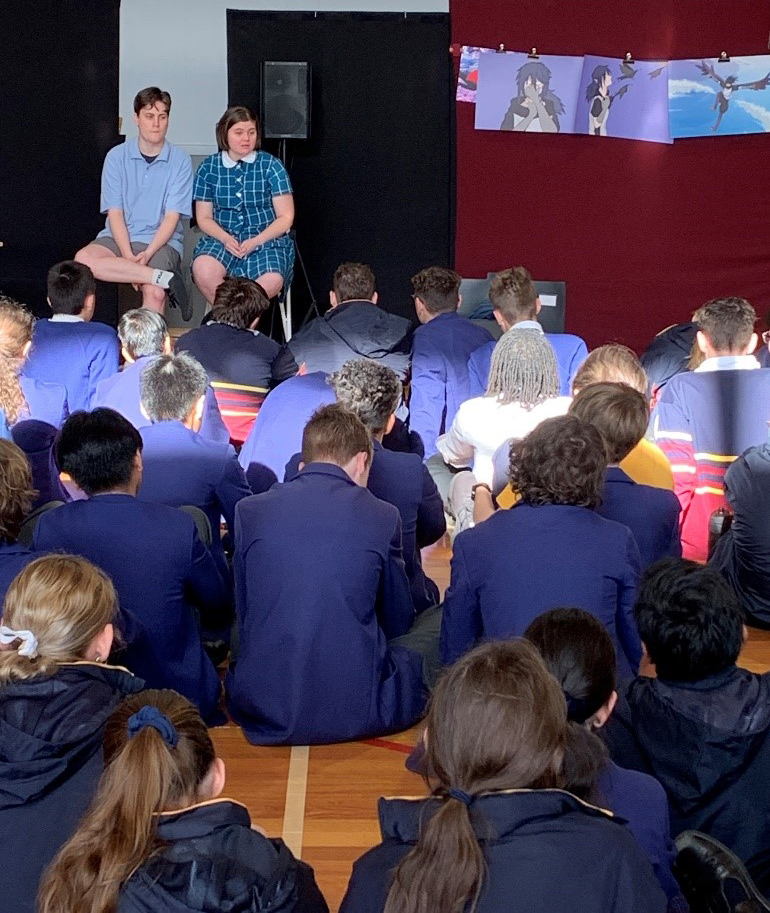 On Monday 31 July, the Traralgon Secondary School had the privilege of watching Brainstorm Productions live show called ‘Wired’. The performance followed the journey of two students whose lives are spiralling in different directions: one towards stress, anxiety and overload; and the other towards depression and disconnection. This interactive experience tackled some of the big issues affecting Australian students such as social isolation, bullying, online safety, school stressors and pressure from social media.
On Monday 31 July, the Traralgon Secondary School had the privilege of watching Brainstorm Productions live show called ‘Wired’. The performance followed the journey of two students whose lives are spiralling in different directions: one towards stress, anxiety and overload; and the other towards depression and disconnection. This interactive experience tackled some of the big issues affecting Australian students such as social isolation, bullying, online safety, school stressors and pressure from social media.
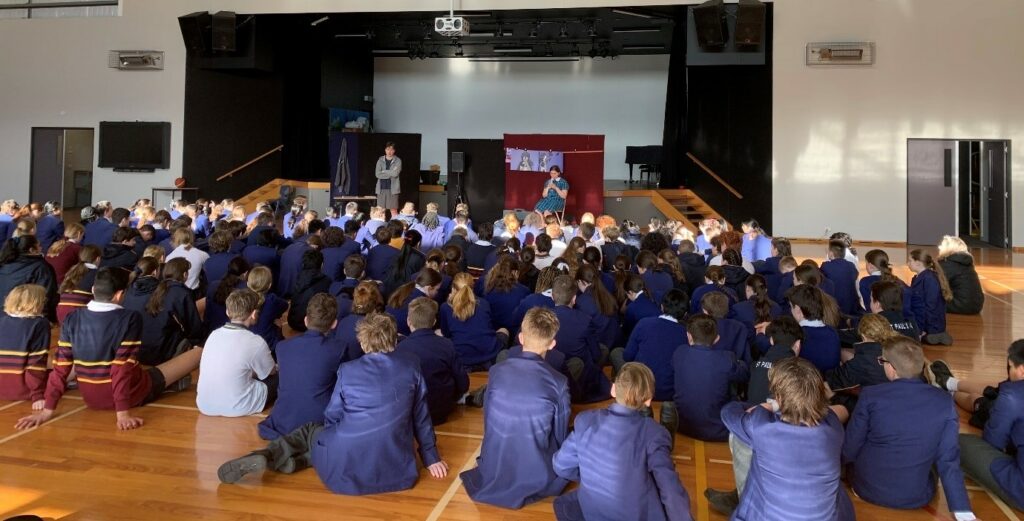 At the end of the performance, a short Q&A session was held so the main issues could be unpacked. Our students were very appreciative of the chance to see a live performance and were actively engaged throughout. A big ‘thank you’ to James and Breeana for their professionalism, energy and willingness to help our students explore complex wellbeing topics.
At the end of the performance, a short Q&A session was held so the main issues could be unpacked. Our students were very appreciative of the chance to see a live performance and were actively engaged throughout. A big ‘thank you’ to James and Breeana for their professionalism, energy and willingness to help our students explore complex wellbeing topics.
Andrew McGrath
Head of Years 7 and 8
Traralgon Secondary School
GIVE A DAMN – GIVE A CAN CAMPAIGN
Thank you to all of the students and families for contributing to the ‘Give a Damn – Give a Can Campaign’ (GADGAC). Collectively the school collected 1,908 cans, which is ninety more than last year. The Secondary School did exceptionally well, collecting 917 of those cans.
Each year the Tin Can Trophy is passed onto the Mentor group who brought in the most cans. The winner will be announced at assembly next week.
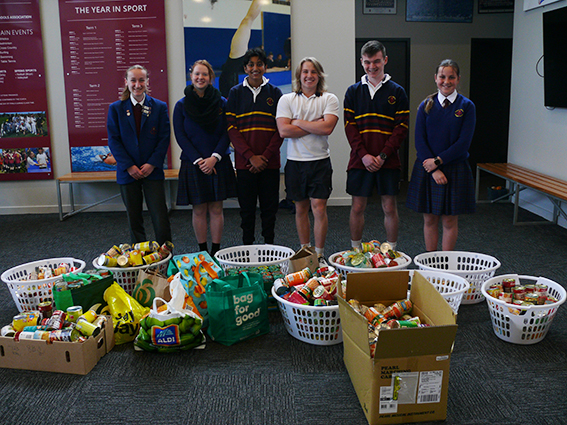
The GADGAC collection with some of the SRC – Georgia Vardy, Grace Marshall, Angad Brar, Jackson Duran, Axel Sellings and Isabella Slocombe.
The cans were collected by Rotary this week and will be passed onto Vinnies to distribute to local families in need. Thanks again for the generosity of our St Paul’s Anglican Grammar School community.
Glen Treble
Chaplain – Traralgon Campus
TRARALGON SECONDARY SCHOOL ENSEMBLE REHEARSAL SCHEDULE
 New members and students having lessons outside of school are most welcome. Please contact Mrs Heather Mason and/or the listed ensemble director for further information: hjmason@stpaulsags.vic.edu.au
New members and students having lessons outside of school are most welcome. Please contact Mrs Heather Mason and/or the listed ensemble director for further information: hjmason@stpaulsags.vic.edu.au
Heather Mason
Head of Performing Arts – Co-curricular


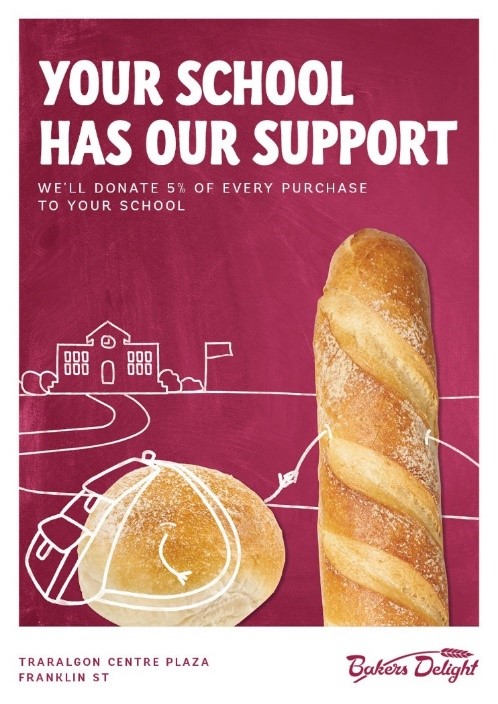
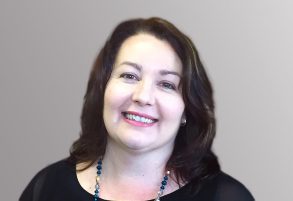
Traralgon Junior School
From the Head of Traralgon Junior School, Ms Tracey King. We have enjoyed a busy couple of weeks in the Junior School! Congratulations to our …
Traralgon Junior School
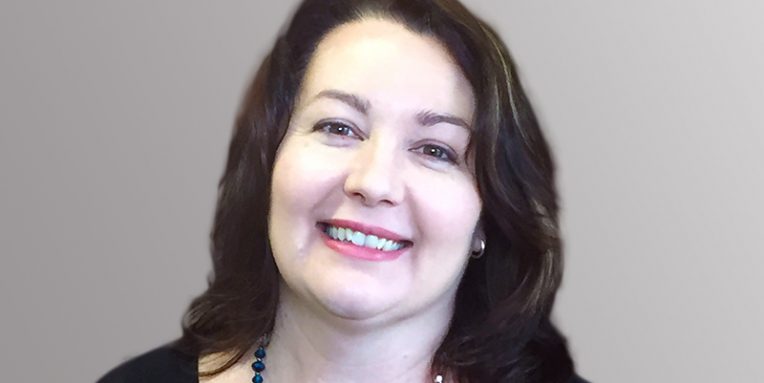
From the Head of Traralgon Junior School,
Ms Tracey King.
We have enjoyed a busy couple of weeks in the Junior School!
Congratulations to our RoboCup teams who competed in the Junior RoboCup challenge last Friday. This was a wonderful opportunity for our students to put their skills to the test and step up into a challenging competition against other schools. Placing third overall, it was a day to be remembered and lots of fun. Many thanks to Ms Hosken, Mr Woodroffe and Miss Settle for their organisation of the event and for their preparation with students over a number of lunchtime practices.
Congratulations also to our basketballers who headed off to play in the District competition. Again, it was a successful day and students returned tired but with smiles all around.
100 Days of Prep was celebrated this week with some adorable costumes and all things to do with the number 100. Ms Berryman, Mrs Vercoe and their students were busy in the Prep rooms with special activities and much laughter and fun. What a fabulous way to celebrate our little people and acknowledge their achievements so far in their first year of formal schooling.
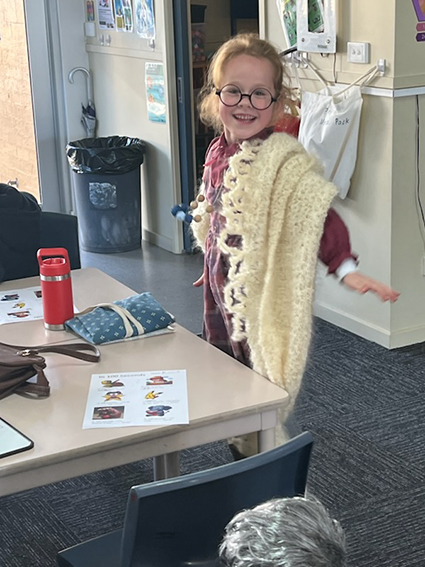
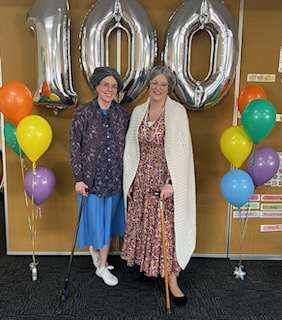
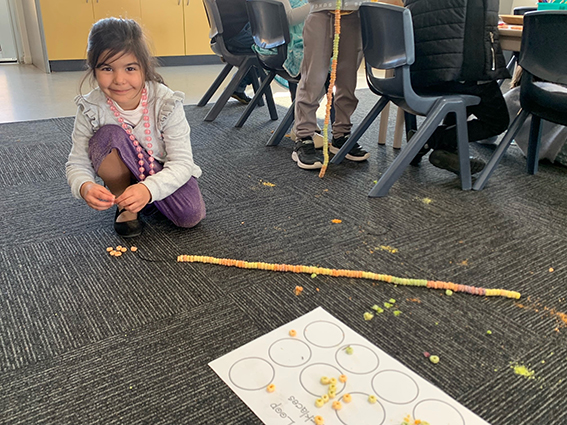
The theme for Science Week this year is ‘Innovation: Powering Future Industries’ and Term 3 is a big term for us in the Junior School with all classes investigating Science and engaging in hands-on lessons and activities. This week we celebrated with our special Science Activity Day. Classes rotated through some engaging and high-interest activities with teachers covering all strands of science. Teachers took on the personas of some very important scientists and students tried to guess who they were: Albert Einstein, John Logie Baird, Alexander Graham Bell, Rachel Carson, Marie Curie, Thomas Edison, Alexander Fleming, Rosalind Franklin, Stephen Hawking, Isaac Newton, Fred Hollows, Tiera Guinn-Fletcher, Jane Goodall, Katherine Johnson, Cecilia Payne-Gaposchkin, Graeme Clark, Elizabeth Blackburn, Galileo Galilei, Marie Tharp, Kizzmekia Corbett and Inge Lehmann. The day focused on building awareness and interest in science for everyone. Some of the activities to chat to your children about include: All About Cells, Digital Microscopes, Using Senses and Making Observations, Designing Marble Runs, Gravity and Bouncing Balls, Building Seismographs, Exploring Water Filtration, Making Sherbet – Chemical Reactions, Awe & Wonder – Fizzy Colours and Elephant Toothpaste.
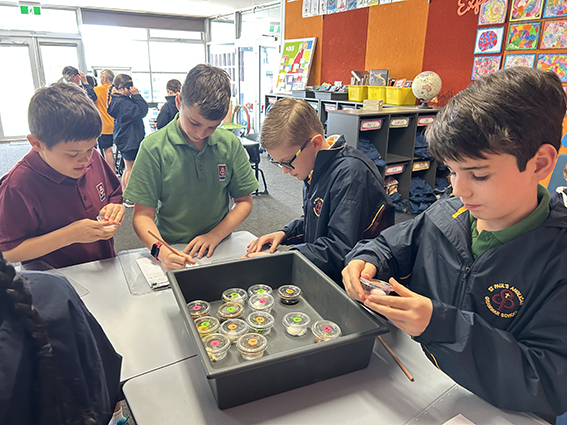
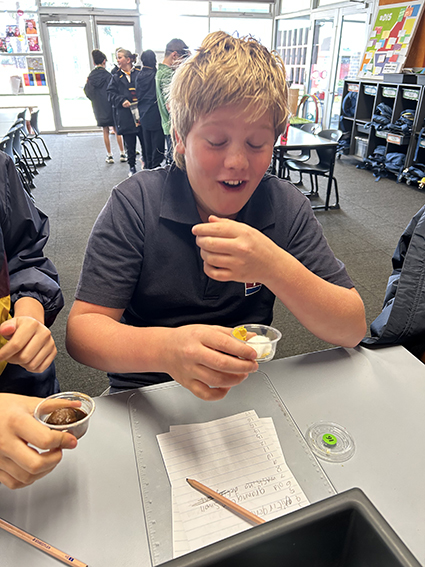

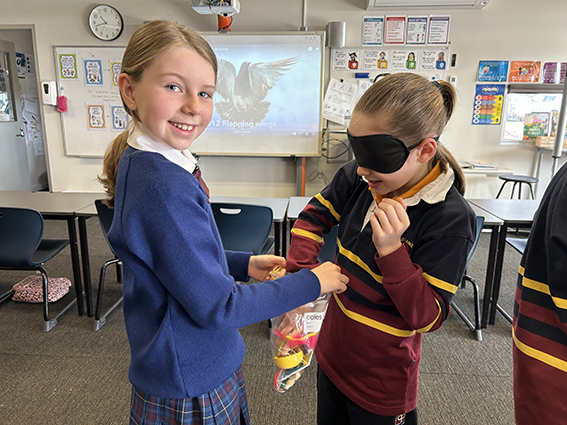
Last week, we enjoyed an important theatrical show from Brainstorm Productions which focused on cyber safety and bullying. Teachers have followed up this show with classroom discussions and lessons about bullying and staying safe on the internet. Whilst we regularly review these topics throughout the year, we will also be participating in the National Day of Action Against Bullying and Violence on Friday 18 August. On this day students are encouraged to wear their hair in a crazy style and use the colours blue and orange to signify their support.
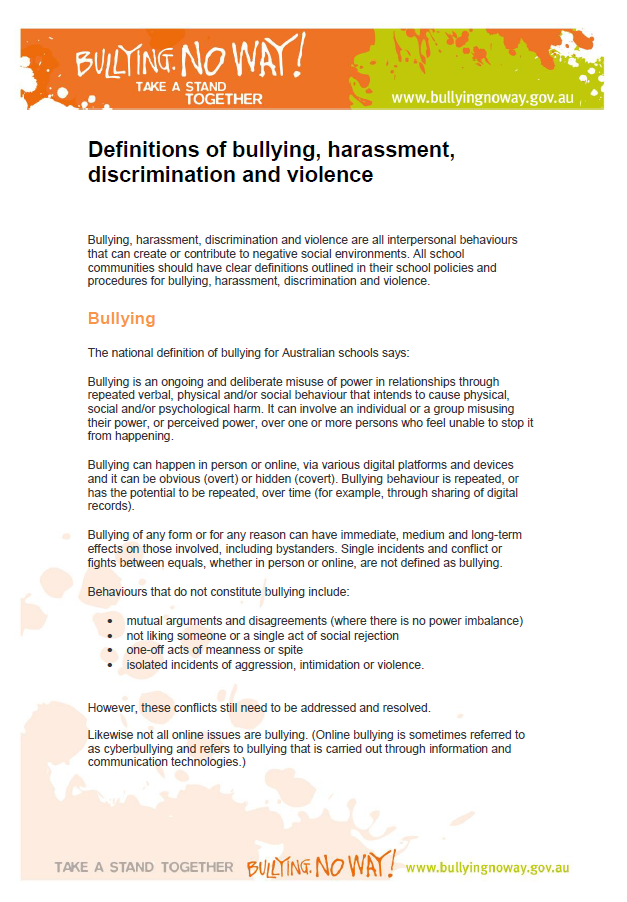
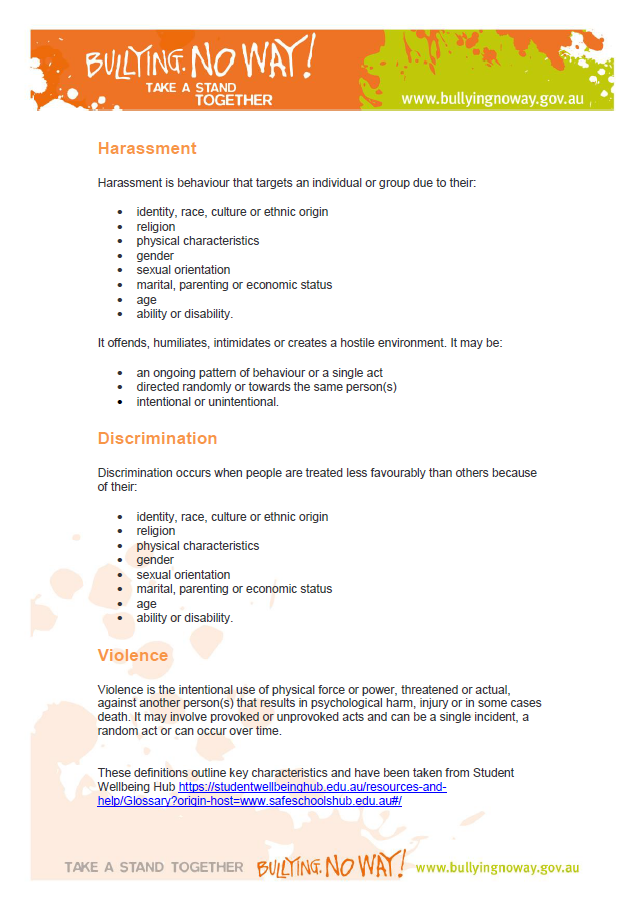 Whether a parent, teacher, student or member of the community, everyone has a role to play in preventing bullying. Further information for families can be found on the Bullying No Way website bullyingnoway.gov.au
Whether a parent, teacher, student or member of the community, everyone has a role to play in preventing bullying. Further information for families can be found on the Bullying No Way website bullyingnoway.gov.au
Give a Damn – Give a Can.
Throughout Week 3, SRC coordinated the Rotary Club of Traralgon Central’s Give a Damn – Give a Can community collection of tinned food. Last year the Traralgon Campus collected a total of 1,818 cans. We are pleased to announce this year we have beaten that amount and raised a total of 1,908 cans, a combined effort between the ELC, Junior School and Secondary School. Each year the Junior School has a friendly competition between classes as we all strive to collect the most cans and win the amazing ‘Can Man’ trophy. Congratulations to the winning class 4G, with a total of 143 cans.
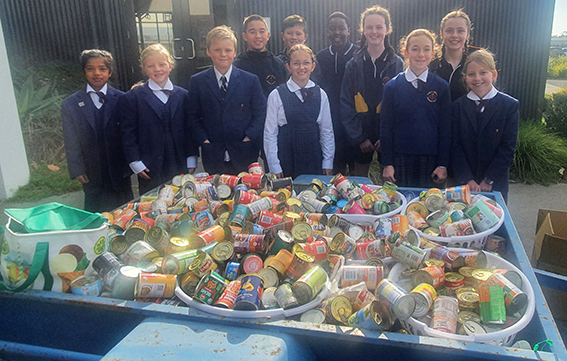 The SRC students helped load the 1,908 cans into the cars and trailer of the Rotary Club representatives so they could transport them to Traralgon Vinnies Food Bank for distribution to needy families in Traralgon and District. Thank you to everyone who supported this campaign and gave so generously.
The SRC students helped load the 1,908 cans into the cars and trailer of the Rotary Club representatives so they could transport them to Traralgon Vinnies Food Bank for distribution to needy families in Traralgon and District. Thank you to everyone who supported this campaign and gave so generously.
School Crossing
You may have noticed in the local paper, articles raising awareness of the need for a school crossing on Cross’s Road. The traffic along Cross’s Road over the past couple of years has dramatically increased along with safety concerns for our students and families as they attempt to cross the road during drop off and pick up times. It is quite alarming to stand on the footpath and watch parents and children as they ‘dash’ across the road at these times especially when there are so many drivers who are speeding. We have engaged with the local council and are pleased to share that we have had some productive discussions about road safety for our local community. Our Junior SRC students have also been involved and have written a letter to council, collected data on Cross’s Road and participated in discussions and consultations.
We invite all parents/guardians to take extra care when travelling local roads and adhere to all speed restrictions. This is particularly relevant to Cross’s Road at the front of the Junior School and the two roundabouts where many children from local schools cross on foot/bike to travel to and from school each day. Our bus loop carpark is a ten kilometre per hour zone and it is indeed worrying to note the number of vehicles that disregard the speed limit each day at drop off and pick up times. Please leave home in plenty of time to ensure that you are not rushing to arrive at school – we know that lives are becoming increasingly busier but we are all concerned for the safety of our students both within and beyond our school grounds each day.
Protective Behaviours
Our protective behaviours program is based on two themes: We all have the right to feel safe at all times. We can talk with someone about anything, no matter what it is. Students have continued their work on protective behaviours as they consider who they might be able to talk to in the event that they feel unsafe.
By sharing protective behaviours with your child, you will be helping to develop lifelong skills of assertiveness, self-confidence, problem-solving, communication, resilience and help-seeking. A good way to help children practise the skills to keep themselves safe is to play problem-solving games. It is often less frightening for a child to pretend that someone else has the problem – like a puppet or character in a story. By using ‘teachable moments’ in your everyday lives and planned activities, your child can learn everyday strategies and understand that they have the right to feel safe at all times.
Help your child to be able to identify the difference. Safe secrets usually have a happy outcome, are kept for a short time and are always told eventually. Several people usually know about the secret, for example, a surprise birthday party or the arrival of a surprise visitor. Unsafe secrets are usually about actions or behaviours that are unsafe or dangerous, for example, when someone is being bullied or hurt. They may make us feel afraid, upset, confused, embarrassed, anxious or unsafe. They are secrets that someone says, “You must not tell”; they last a long time, sometimes forever. Unsafe secrets can involve a threat that something bad will happen if you tell.
If your child tells you that they have a secret, you may find the following questions helpful as a guide: Do you want to tell me about the secret?
If the answer is ‘no’, try some of the following questions:
• Is it a safe secret or unsafe secret?
• Who told you the secret?
• Who else knows the secret?
• How do you feel about the secret?
• Do you have any early warning signs?
• Is there someone you can talk with about it?
Bravehearts is a terrific website for more information and resources for parents to help teach children about personal safety, https://bravehearts.org.au/about-child-sexual-abuse/resources-for-parents-carers/.
Tracey King
Head of Traralgon Junior School
WHAT’S ON
AUGUST
18 August National Day of Action Against Bullying
21 August Book Week
23 August Book Character Parade
Parent Student Teacher Interviews (PSTIs), 3:45 pm to 8:00 pm
24 August Parent Student Teacher Interviews (PSTIs), 3:45 pm to 6:00 pm
28 August Latrobe Valley Eisteddfod, Choir
28 to 30 August Years 3 and 4 Camp
31 August Years 5 and 6 Poetry Workshop
Fathers’ Evening Event
SEPTEMBER
1 September FOSP Father’s Day Stall
6 September Musical
12 September Vicspell State Final
13 September Division Athletics
14 September Classroom Expos
R U OK? Day
15 September Footy Colours
End of Term 3, 2:20 pm finish
DOBSONS TRADING HOURS

Order online or click and collect: Please ensure that you only attend the store to collect your items once you have received notification that your order is ready, order here.
PARENTING SUPPORT
We have all heard the saying, “Parenting doesn’t come with a manual”. Whilst this is certainly true, there are programs out there that are designed to upskill and provide guidance to parents.
Parentline
Parentline is a free telephone counselling service for Victorian parents and carers of children and adolescents aged 0 to 18 years. Run by social workers, psychologists and family therapists, Parentline runs from 8:00 am until midnight, every day of the year. You can speak to the same counsellor each time you call and there is no time limit or maximum number of calls you can make. If you are ever in need of parenting advice or support, call Parentline on 13 22 89.
Reach Out Coaching
Reach Out has a free coaching service for parents, designed to help you support your teenagers through tough times. This is a confidential service for parents of adolescents aged 12 to 18 years. Delivered in a one-to-one format, you can access four free coaching sessions at https://parents.au.reachout.com/one-on-one-support.
Triple P
Triple P is an evidence-based parenting program that helps to increase your confidence in raising your children. It is designed to improve parent-child relationships as well as give you the tools to encourage positive behaviour, teach new skills/behaviours and manage misbehaviour. The strategies provided are easily adapted to suit your own values, beliefs and your family’s needs. Triple P is a program that is delivered worldwide and many studies have demonstrated how effective it can be.
Triple P also has a program for parents of children with anxiety. This program helps you to understand your child’s anxiety and the ways you can help your child manage this. It also teaches you how to teach your child strategies for managing anxiety, both now and in the future.
Both of these programs are currently free and are able to be completed online at a time that suits you. Delivered in thirty to sixty minute modules, you can complete this on your phone, tablet or laptop/computer. You can access the Triple P program at https://www.triplep-parenting.net.au/au/free-parenting-courses/triple-p-online-under-12/.
Family Man
Family Man is a free, online parenting program designed for dads, although mums and other carers are welcome to use it as well. Evidence-based and designed by leading experts, you can even sign up to receive a daily text message for two weeks containing tips and techniques. You can access this program at https://familyman.movember.com/en-au/.
MyStPauls
The MyStPauls Student Wellbeing Information For Parents page has a collection of resources and programs that have been selected by the St Paul’s Anglican Grammar School counselling team to support you in supporting your children. Updated frequently, this can be a useful tool if you are looking for information. Visit the page at https://my.stpaulsags.vic.edu.au/homepage/13368.
Shannon Staples
Head of Counselling Services
ROBOCUP
On Friday 4 August, fifteen Years 5 and 6 students from the Traralgon Junior School travelled to Ramlegh Park Primary School to participate in RoboCup. There were three different events: Soccer, OnStage and Rescue Line, all students entered the Rescue Line event. In this event there were two courses, Riley Rover and Primary Rescue. The Riley Rover competition had three teams from St Paul’s Anglican Grammar School and the Primary Rescue competition had two teams. In both competitions, students had to code the robot to follow a line using colour sensors.
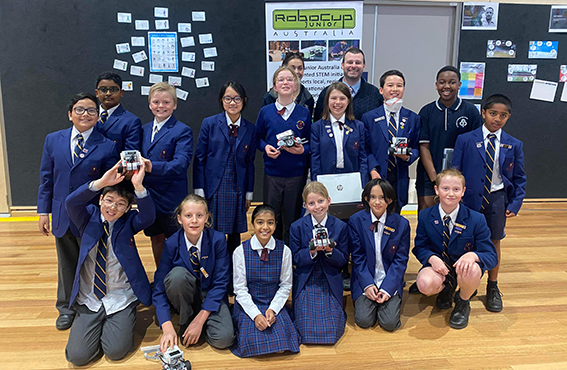
RoboCup participants.
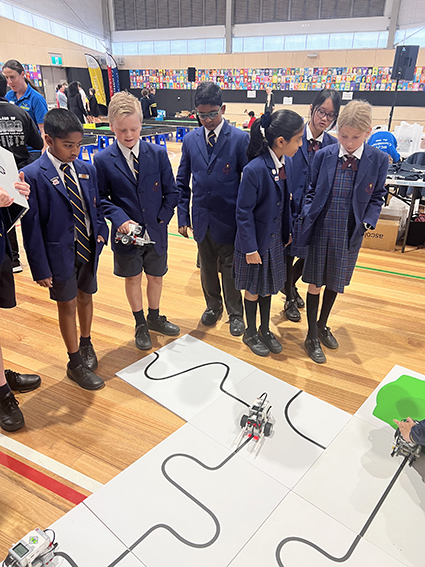
Students practising with their robots.
At the end of the course, the robot had to knock a can off the ‘acid’ tile. In Primary Rescue, Team Destroyer came third and Dora and the Explorers came second. Thanks to Miss Bec for driving the minibus all the way to Ramlegh Park Primary School and to Ms Hosken and Mr Woodroffe for organising and supporting the teams through RoboCup.
Ava Stuckey and Charvi Mageswaran
RoboCup Participants
CLASS UPDATES
Prep
The day our Prep students have been waiting for all year finally arrived this week! Students excitedly arrived dressed as if they were 100 years old, ready for our ‘100th Day of School’ celebrations. They did a tour of the school showing off their outfits and participated in a variety of 100-themed activities, including seeing how many star jumps they could do in 100 seconds and making Froot Loop necklaces. It was lovely for our other year levels to welcome the preps and there were lots of smiles throughout the day.
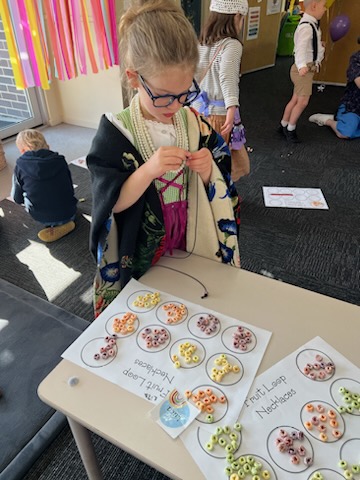
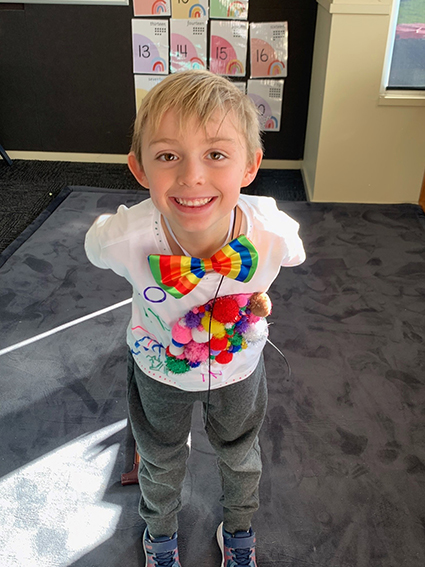
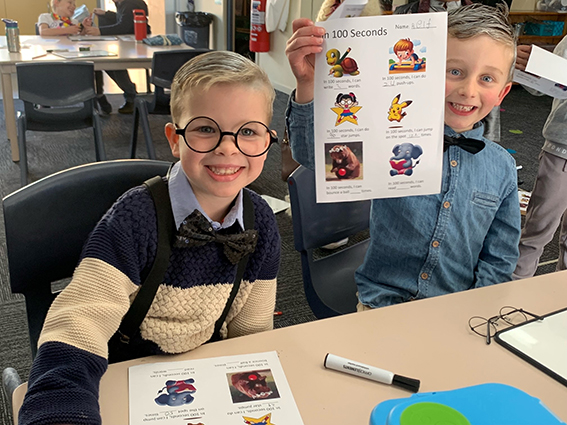
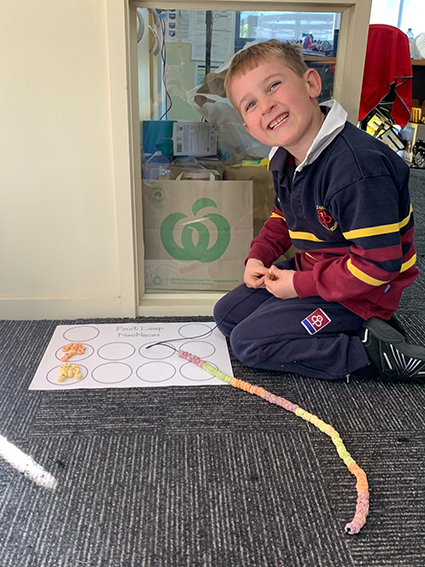
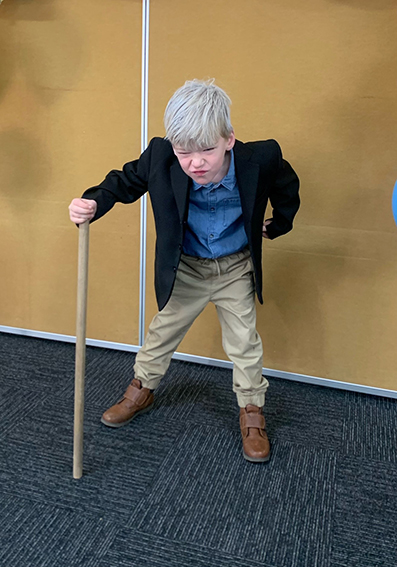
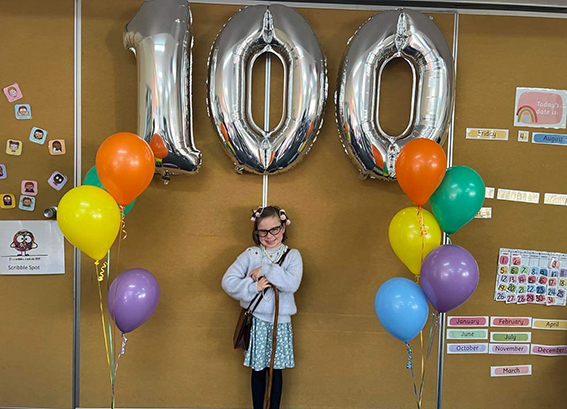
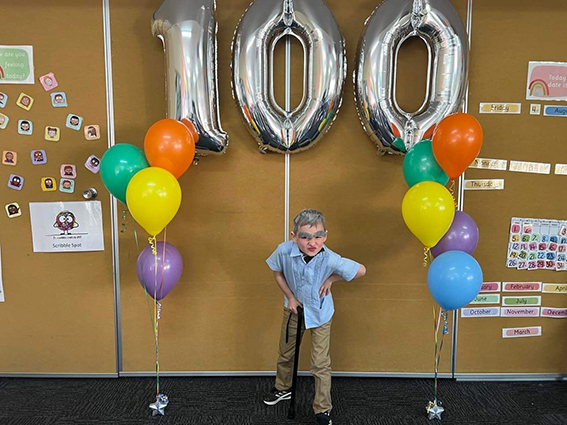
Year 1
In Year 1, we have been learning about adjectives. We know that they are used to describe nouns and have been adding them to our sentence writing. We are enjoying learning about suffixes and have been following spelling rules to add them to the end of base words.
In Maths, we have practised adding and subtracting ten from larger numbers. We also spent time exploring capacity, estimating and measuring the size of containers using blocks and sand.
We have continued learning about sound and enjoyed making kazoos out of everyday materials.
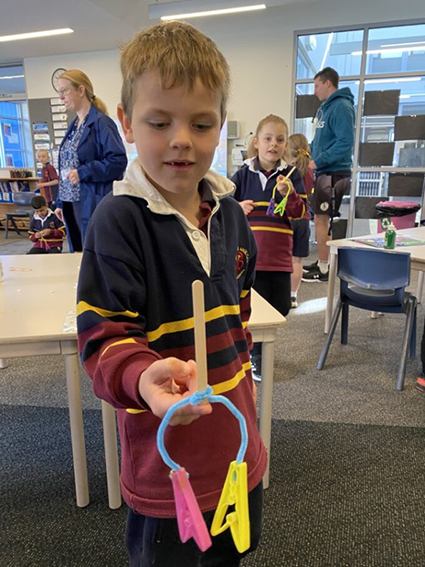
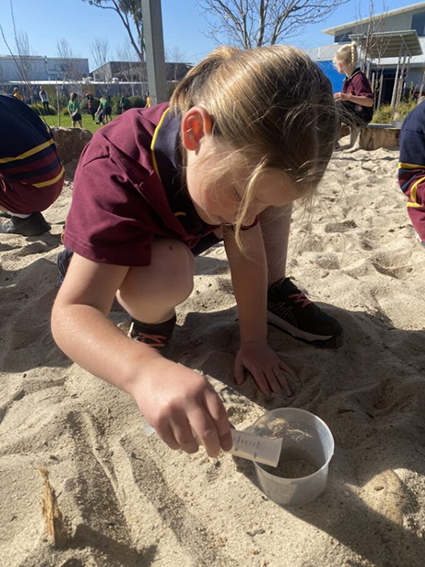
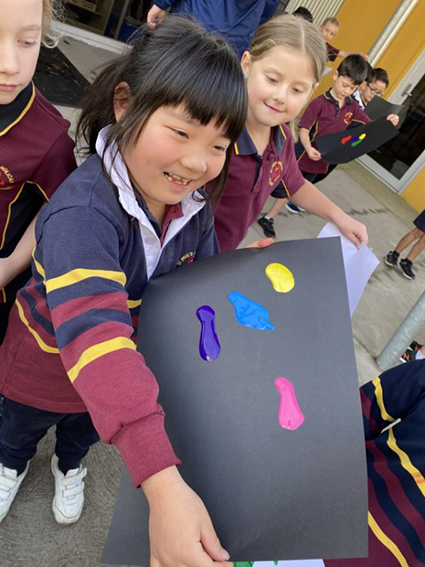
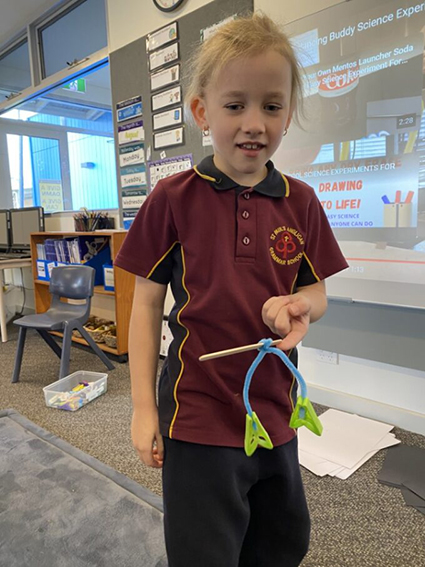
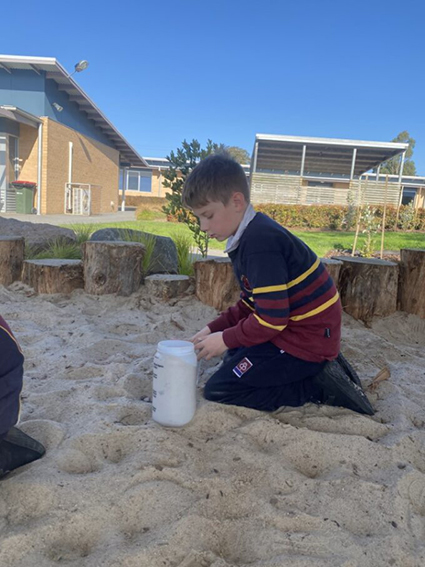
Year 2
Year 2 students have been practising hard, ready for their eisteddfod on Thursday 10 August. Their first performance is in front of friends at a whole school assembly.
Term 3’s first writing focus has been on procedural texts. Students focused on their morning routines and documented the steps and materials. They have also been working hard to create a range of sentence types. They have been able to use new vocabulary words and morphological elements in these sentences.
Their numeracy focus has been on connecting division to multiplication, solidifying their use of addition and subtraction algorithms and telling time to the quarter hour.
Year 3
Science Day – The Year 3 students became Seismologists for the day! They had a fabulous time learning all about earthquakes, how they form, tectonic plates, seismographs, the stability of structures and the Ring of Fire! Inspired by a famous Lego Masters challenge, they explored how stable different structures would hold up to a virtual earthquake of varying strengths. There were so many amazing ideas, trial and error and our little scientists did a magnificent job of creating their own seismograph to measure the strength of their earthquake.
Year 4
The Year 4 students have been continuing to expand their vocabulary in Literacy and have started a collection of exciting words to use in their future writing pieces. They are combining computer skills with their Literacy and have started creating a ‘Word Collector’ PowerPoint of interesting vocabulary to which they will add more words throughout the term.
In Numeracy, the students have been learning more about fractions and mixed numbers; how to count using fractions, as well as representing these on a number line. They have also looked at how fractions can be written as decimals.
On Wednesday, the students were fortunate enough to watch a performance by Brainstorm Productions, called Zanna and the Lost Code. This performance delivered a strong message to the students about how to stay safe online and to make sure that they show respect to others at home, at school and online.
Our Science Activity Day was a fantastic day and the students had lots of fun learning all about cells, earthquakes, gravity and how to make elephant toothpaste.
Year 5
This term our CORE Knowledge lessons are Science-based, where we incorporate experiments into the curriculum. Our readings have been focused on Water Quality and Pollution.
In the attached images, the class was experimenting with point source pollution. The water represented a water body (lake or ocean), the food colouring represents a point source of pollution (chemicals used on a farm) and the pebble represented the land.




Year 6
It has been an enjoyable couple of weeks for the Year 6 cohort. Students have had many co-curricular opportunities ranging from AFLW, District Basketball, RoboCup, Science Day and ICAS. Congratulations to our AFLW team who enjoyed competing on Tuesday 8 August at the Traralgon West Complex. Our Years 5 and 6 District Basketball team competed well during their matches at Gippsland Regional Indoor Sport Stadium and showed great sportsmanship. We thank the RoboCup team for showing persistence and resilience at their recent competition. They worked hard and displayed fantastic teamwork and digital tech skills. The highlight of Science Day for Year 6 students was being able to have a sample of the four different branches of Science, including Earth Science, Physical Science, Biological Science and Chemical Science. Mrs Sellings and Mrs Clavarino also had fun adopting the persona of crazy Scientists for the day! This week Year 6 students were especially excited to receive a visit from Mrs Clark and Mr McGrath from our Traralgon Secondary School. The Head of Secondary School and Head of Year 7 spoke to the students about the upcoming Friendship Day at our Traralgon Secondary School. Students were glad to have the opportunity to ask questions and learn about the routines for Year 7 in 2024.
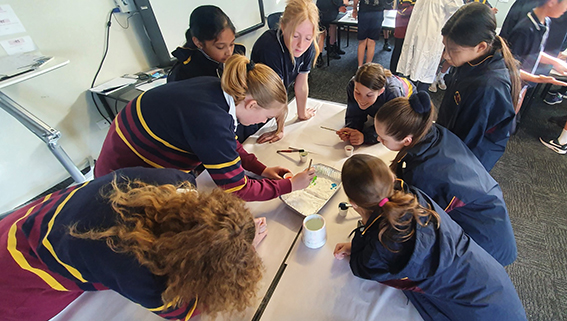
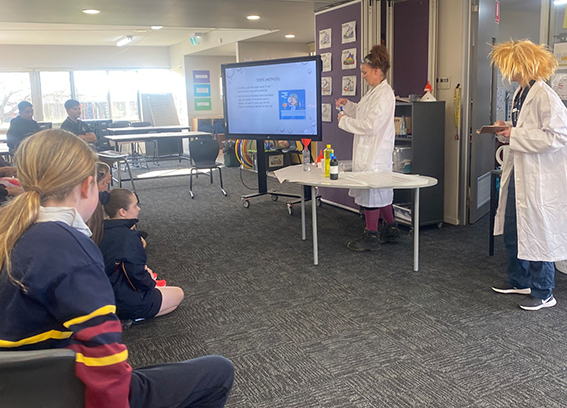
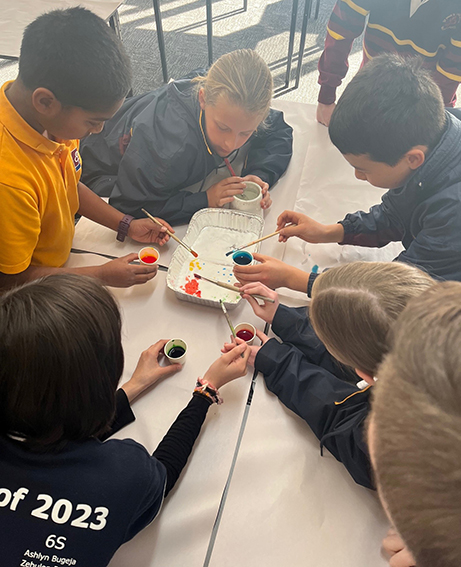
TRARALGON JUNIOR SCHOOL ENSEMBLE REHEARSAL SCHEDULE
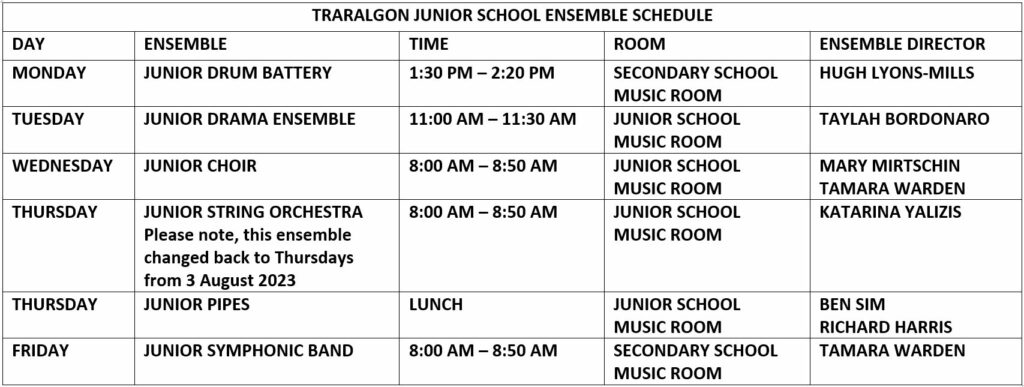 New members and students having lessons outside of school are most welcome. Please contact Mrs Heather Mason and/or the listed ensemble director for further information: hjmason@stpaulsags.vic.edu.au
New members and students having lessons outside of school are most welcome. Please contact Mrs Heather Mason and/or the listed ensemble director for further information: hjmason@stpaulsags.vic.edu.au
Heather Mason
Head of Performing Arts – Co-curricular
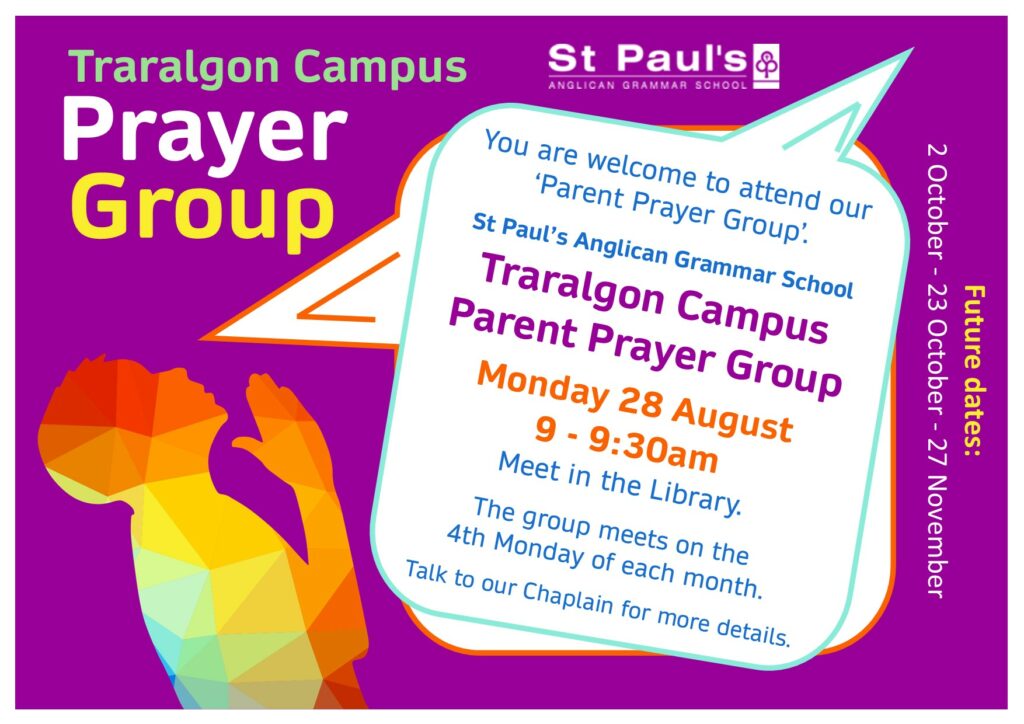

NEWS FROM OSHC
Our numbers are growing with students enjoying the opportunity to socialise and have fun playing games and being creative together.
Our Mentor Chris from Secondary School, brings a breath of fresh air to the group on Tuesdays. Chris brings a whole new level of fun with fun conversations over afternoon tea, shooting hoops and exploring the secondary school grounds where he introduced us to the chickens and their veggie patch.
This week we have had fun celebrating Science Week with colourful science activities.
Cath Stoney
Founder and Director
Club House Boot Camp



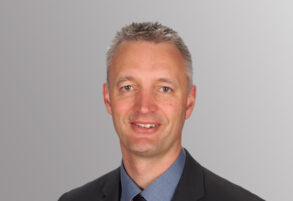
From the Chaplain
WHAT THE FORK? Hearing people swear is an everyday occurrence for me but being identified as a ‘religious person’ has strange effects on people. One …
From the Chaplain
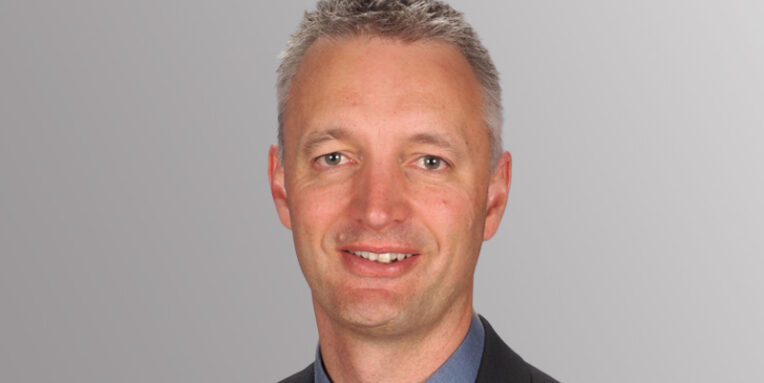
WHAT THE FORK?
Hearing people swear is an everyday occurrence for me but being identified as a ‘religious person’ has strange effects on people. One of these is a heightened consciousness of language – in particular, swearing. People will apologise for swearing near me; people will make comments about not swearing anymore if I enter a room or join a conversation; people get very embarrassed if they swear in my hearing and then realise what they have just said. Somehow swearing becomes a moral and spiritual issue – at least momentarily. So, I thought it might be fun to unpack this idea a bit.
Some people take a very moralistic view of swearing and view its pervasiveness as a clear symptom of the collapse of civility in modern society. Others take a more practical view, arguing that the ubiquity of four-letter words actually makes it less of a concern. There are one or two genuinely taboo words but the rest of this language has gotten so ordinary that it is not profane, merely colourful. Just make sure kids learn not to use it at inappropriate times, the same way they learn not to burp in public.
So why do we swear in the first place?
Melanie Burns (2008) argues that swearing serves two social functions. First, it is a physiological release of energy – in this sense, swearing is a socially-sanctioned way to express aggression. Second, swearing is a sociolinguistic marker. It helps people to express their belonging to special cultures and subcultures (Burns, M. C. ‘Why We Swear: The Functions of Offensive Language, Monash University Linguistics Papers 6(1): 61-69).
Neuroscientific research suggests that swearing might be located in different parts of the brain from other speech regions. Specifically, it might activate parts of the “limbic system” (including features known as the basal ganglia and the amygdala). These deep structures are involved in aspects of memory and emotion processing which are instinctive and difficult to inhibit. This might explain why swearing can remain intact in people who have suffered brain damage and struggle to speak as a result. It may also explain why teenagers, whose brains are still developing, are often more prone to swearing than many adults. Laboratory-based experiments also show cognitive effects. We know that swear words command more attention and are better remembered than other words. But they also interfere with the cognitive processing of other words/stimuli – so it seems swearing can sometimes get in the way of thinking, too. Swearing arouses emotions. This can be measured in autonomic responses such as increased sweating and sometimes increased heart rate. These changes suggest that swearing can trigger the “fight or flight” function. Again, this fits with the adolescent experience. Because the prefrontal cortex is still developing, teenagers might rely on a part of the brain called the amygdala to make decisions and solve problems more than adults do. And apparently swearing is right at home in this part of the brain.
So, what about Christians? Is swearing a spiritual issue? Christians are certainly encouraged to be mindful of their speech. For example, “Let no evil talk come out of your mouths but only what is useful for building up, as there is need, so that your words may give grace to those who hear.” (Ephesians 4:29) or “Let your speech always be gracious, seasoned with salt, so that you may know how you ought to answer everyone.” (Colossians 4:6). But there is no list of prohibited words that a Christian should not say. In fact, what is considered a swear word is very culturally dependent and has changed many times over the course of history. During the Renaissance, terms that had simply been direct or descriptive during the Middle Ages and which could once be found in medical treatises describing anatomy began to take over as the new swear words. While in the Victorian era, even now-banal words like leg and trouser were seen as taboo. And just to cloud the matter further, the Bible contains a lot of cursing as devotion. Think especially of the Psalms. There are some Psalms called imprecatory; that means they invoke judgement, calamity or curses, upon one’s enemies or those perceived as the enemies of God. Take this excerpt from Psalm 109.
“8 Let his life be cut short,
and let someone else take over his work.
9 Let his children become orphans and his wife a widow.
10 Make his children wander around as beggars,
forced from homes that lie in ruins.
11 Let the people he owes take everything he owns.
Let strangers get everything he worked for.
12 Let no one be kind to him.
Let no one show mercy to his children.”
(Psalm 109:8-12 Easy-to-Read Version)
Where does this leave us? I would suggest that when it comes to swearing, context is everything. Swearing in response to sudden intense pain is a helpful psychological coping mechanism. If a student jams their finger in their locker door and swears, surely my concern is for the wellbeing of the finger rather than the student’s choice of language in the moment. Especially when swearing may actually be helping them cope with the pain.
Swearing at someone else, particularly in anger and with intent to wound, is a different matter. But the problem is still not necessarily the choice of words so much as the attitude and intent behind them. Telling someone that “you can’t stand them, and you wish they would get lost” seems just as hurtful as telling them to “get forked” (as they say in “The Good Place”) and neither option has much redemptive value. “Who are you swearing at, and why?” will almost always be a more relevant question than, “What was the swear word you used?” Any sort of verbal abuse is unacceptable, regardless of whether it involves swear words, and I would be quick to challenge any student that spoke to someone in such a way.
But what about swearing as a response to injustice? Why would harsh words be considered more disgusting than real-life tragedies, activists ask? Isn’t strong emotion an appropriate response to tragedy and injustice? In their study of the Book of Amos, our Year 10 students discover a God who is unimpressed by pious religious displays and absolutely damning of any act of injustice by the Israelite people. It would not surprise me if the Old Testament prophets dropped a swear word or two in their time.
The swearing that bothers me the most, particularly in a school context, is swearing as a habitual or compulsive response to things. We want to help teenagers develop their reasoning and decision-making abilities and move their language out of the realm of the amygdala and into the prefrontal cortex. Discouraging them from habitual swearing may well assist them with this.
In the end, if I was particularly sensitive to swearing then I might want to think twice about working with teenagers. And if the presence of a ‘religious person’ causes others to think for a moment about their language then I suppose that is a good thing. As for me, I will take my cue from the prayer of David, “Let my words and my thoughts be pleasing to you, Lord, because you are my mighty rock and my protector.” (Psalm 19:14)
(On a different topic – for those of you who enjoy theological movie reviews, I highly recommend this review of the Barbie movie https://www.holypost.com/post/neither-barbie-nor-ken).
Reverend Daniel Lowe
Senior Chaplain
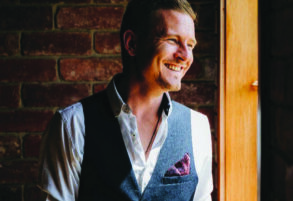
Alumni Profile
BRINLEY EASTWOOD, Class of 2006. Brinley Eastwood was School Captain in Year 6 and Middle School Captain in Year 9 and warmly recalls the opportunities, …
Alumni Profile
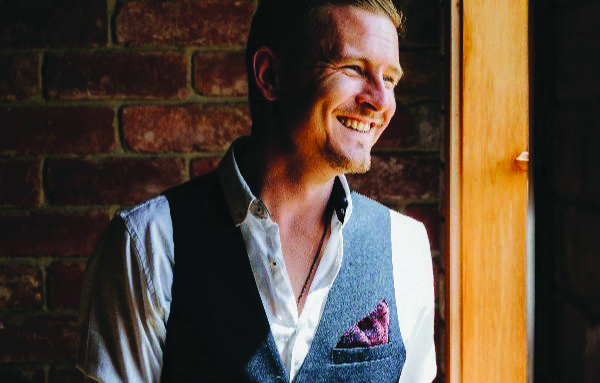
BRINLEY EASTWOOD,
Class of 2006.
Brinley Eastwood was School Captain in Year 6 and Middle School Captain in Year 9 and warmly recalls the opportunities, environment and teaching staff from his time at St Paul’s. He also participated in numerous school productions and performances.
Brinley went on to complete a Diploma in Dance Teaching and Performance after graduating from St Paul’s, making it onto the big screen. “I danced on a few TV shows, most notably the Footy Show Players Revue and was also a supporting actor (one episode) on Neighbours,” he revealed. “I then had my first child and decided I needed to get a proper career so I could spend more time with my son, so I transitioned into Commercial Vehicle Spare Parts. From there I’ve worked at Multispares, Tesla and now I’m a Parts Specialist at Mercedes Benz. When beginning my career in Spare Parts and Inventory Control, I had one goal and it was to work at Mercedes Benz.”
 Brinley’s passion for all things Mercedes and motorsport motivated him to pursue his current role and it was his hard work and eagerness to learn that enabled him to succeed. “I’m incredibly passionate about motorsport and Mercedes. It was always my goal as a Parts Specialist to work for Mercedes Benz.” Brinley stated that his profession can be demanding and that managing his time can be challenging. “I love the challenge. It involves supplying parts to the Mercedes Benz workshop but also over the counter customers, workshops and panel shops all over Victoria.”
Brinley’s passion for all things Mercedes and motorsport motivated him to pursue his current role and it was his hard work and eagerness to learn that enabled him to succeed. “I’m incredibly passionate about motorsport and Mercedes. It was always my goal as a Parts Specialist to work for Mercedes Benz.” Brinley stated that his profession can be demanding and that managing his time can be challenging. “I love the challenge. It involves supplying parts to the Mercedes Benz workshop but also over the counter customers, workshops and panel shops all over Victoria.”
Brinley offers the following advice: “Even if the walls seem to be closing in, hard work and persistence will land you your dream job. Always believe in yourself!”
Keep in touch
We love sharing alumni stories that provide inspiration to current students – and teachers always love to hear what former students are up to now!
If you would like to share your story with the St Paul’s community or would like to mentor or speak with our current students, please reach out by emailing alumni@stpaulsags.vic.edu.au or connect with us on our St Paul’s Alumni Association Facebook page and our St Paul’s Anglican Grammar School official LinkedIn page.
(Profile information correct at time of collection.)
So we can contact you with alumni news and invitations please update your details via the new St Paul’s webpage https://www.stpaulsags.vic.edu.au/community/alumni/.
If you would like to join us in creating an event of nostalgia, connection and laughter for our Class of 1993, 2003 and 2013 cohorts, email alumni@stpaulsags.vic.edu.au to be a part of our next celebration!
